#this one is an experimental and not specifically stated to be about suicide
Explore tagged Tumblr posts
Text
Blatantly Partisan Party Review IX (federal 2025): Family First
Running where: for the Senate in NSW, QLD, SA, and VIC, and for a solid collection of House divisions in the same four states plus Fenner in the ACT
Prior reviews: federal 2013, VIC 2014, federal 2016, VIC 2022, NSW 2023
What I said before: “This theocratic authoritarianism is not simply an inappropriate basis to govern a large and diverse community; it is riven with hate and should be repudiated loudly and thoroughly.” (VIC 2022)
What I think this year: Family First are, unfortunately, back on federal ballots after a period of deregistration. The original iteration of Family First collapsed in 2017 after Bob Day, their Senator for SA, got section-44’d out of parliament under a bankruptcy cloud and his replacement, Lucy Gichuhi, defected to the Liberals rather than participate in a merger with Cory Bernardi’s Australian Conservatives. That party soon went defunct and two ex-Labor state MPs, Jack Snelling and Tom Kenyon, got the party’s database and resurrected Family First. You won’t be surprised to learn that they are social conservatives (i.e. bigots) from Australia’s worst union, the Shoppies, although it’s still striking to see a party typically associated with Protestantism revived by two Catholics. Kenyon today is the party chairperson, while the leader is Lyle Shelton, a Protestant famous for eating shit.
Bob Day is quite unhappy about the party returning without him. He registered the Australian Family Party at state level in SA and ran on its behalf at the last federal election as an independent (see my review here). He opposed this registration of Family First unsuccessfully, and he’s apparently gone even more batshit crazy than he used to be because he’s now running for the Trumpet of Patriots—and only as their second candidate on the SA ticket. Mate, you’re a former Senator, have some self-respect and demand top billing. Anyway, let’s move on from Day to what his erstwhile party is offering this year.
To a considerable extent, Family First is a vehicle for Shelton and his grievances, in much the same way as the Australian Christian Lobby under his leadership in the 2010s was defined by how steaming mad he got about same-sex couples. The menu across the top of the website even invites you to buy Lyle’s book (I’d rather set the $30 on fire thanks). If you check the issues tab, the first specific issue listed is drag queen storytime, a thing young kids really enjoy that only the most deranged dullards think causes “confusion and distress”. If the biggest thing you’re worried about is that people dressed elaborately are at libraries to promote literacy and a love of reading to children, you’re actively looking for things to make you mad—and, indeed, seemingly struggling so hard to find things genuinely maddening that you’ve settled on something that ought to be uncontroversial.
If you are exposed to too much Seppo social media and are familiar with the main themes pursued by far-right religious crackpots in the US culture wars, you won’t be surprised by the rest of Family First’s platform. Lyle slurps from the septic tank and it shows. You don’t need me to tell you that Family First opposes women’s reproductive rights or that they want to exempt private Christian schools from discrimination laws. They really hate trans people, and their policies would cause untold harm particularly for trans children: one of their big issues is a “close the gender clinics campaign”. I think we should instead evict Lyle from his house and open one there.
The most galling part of Family First's rhetoric about trans children is not the offensive depiction of them as “confused” or of puberty blockers as “medical experimentation”, but claiming that many who do transition are suicidal, with the implication this is a consequence of their transition. The reality is that refusing to allow people to transition, forcing them to live an identity other than their own, and discriminating against those who do transition are major causes of suicidality among trans youth. So much makes me mad reading Shelton’s work but this has got me especially worked up.
Go and eat more shit, Lyle.
Recommendation: In the House, give Family First candidates a very low preference; in the Senate, give Family First a weak or no preference.
Website: https://www.familyfirstparty.org.au/
#auspol#ausvotes#ausvotes25#Australian election#Australia#Family First Party#Family First#fundies first#religious fundamentalism#Lyle Shelton#eat shit Lyle#fundies#weak or no preference
23 notes
·
View notes
Note
Ur post referencing it being out of Ray’s character to admit his relationship to Isabella is scratching my brain
the only scenario i can think of is if his past experiences helped someone so he would be forced to encourage/give insight in a way that Norman or Emma can’t
maybe one of the kids finds their blood-mom and even though she is sweet and doing her best to form a connection the kid is still too scared to try and doesn’t want a relationship that the others have?
(Especially if the younger ones are still traumatized over losing Lucas and Yuugo i think it would be hard to seek out an parental attachments)
maybe ray would encourage them to try while they still have time that he didn’t? because he admits he regrets never having the chance to build the relationship that he wanted or could have had with Isabella
[Referencing the tags of this reblog]
Me in the "there's an app for that voice": There's a banana_slug_army fic for that (specifically Sunshine and Solace chapter 4) where Ray navigates this without bringing up his own situation until it's unavoidable.
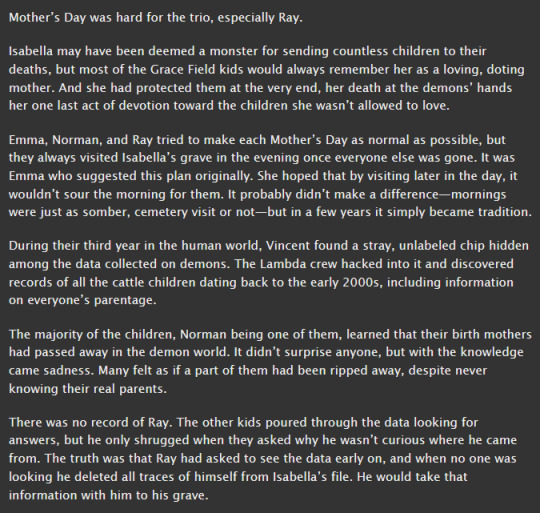

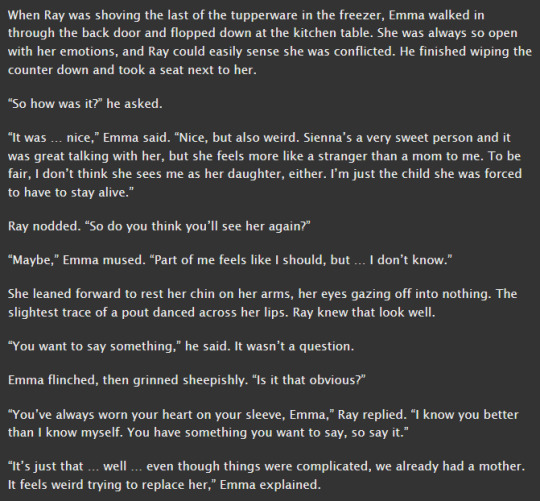
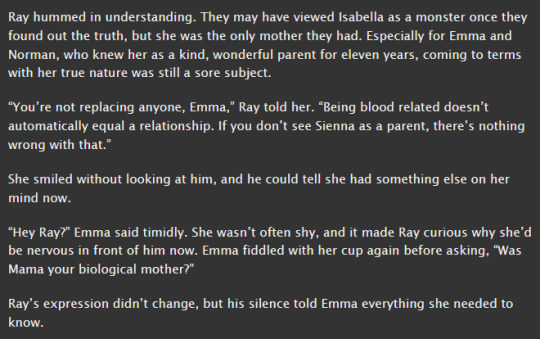
While in the hands of skilled writers I'm open to a variety of ways to get there, I'm of the mind he'd never admit it of his own volition, and it would have to be outside factors that would prompt him to discuss it in his teens like what's presented here.


(Mystic Code Book Chapter 6 Q&A)
This is largely centered around him hating pity directed towards him, which I've touched on in posts like this one. To plagiarize myself from a few others:
[x] You can feel the profound weight of a lifetime of suffering and loss on his face as he grapples with trying to keep his emotions out of what he’ll say next, because he never brings up how what happened in all the years prior made him feel, not even when Emma provides him with an opportunity where she prompts him with speculation about what it must have been like seeing dozens of their siblings off and being powerless to do anything about it in episode 5… But Ray never explicitly colors his recollections with emotions when discussing them with Emma and Norman, how what was happening around him and what he and Isabella did made him feel, and only displays the full anguish of what that did to him when he's speaking with Emma on the night of January 14th. While the two knew Ray intended to kill himself to serve as a distraction for them to escape, Emma never knew how deeply he internalized his self-loathing and the belief that he deserved to die for his actions and inaction until that eventful night, otherwise she would have asked one of the other kids to go talk to him, if not just have said “fuck it” and did it herself, Isabella's watchful eye be damned. She would not have let him suffer to that degree so long on his own; it goes against every fiber of her being. Ray keeps all of that inside though, because he doesn't want their pity. He doesn't believe he deserves any when he actively chose to become Isabella's informant and which children would be shipped out early due to his experimentation with the trackers, least of all from the two people who are firmly categorized as genuinely good and worth saving in his mind. He loves them enough to squash down his humanity and die for them. --- [x] She was the only mother they ever knew, and I do entirely understand why people prioritize Ray in these reveal situations, but he never brings up their connection once in canon, for similar reasons to why he never explicitly states how watching his siblings get shipped out made him feel until he’s in a manic state, working himself up into a frenzy so he can go through with his suicide: he absolutely loathes pity for what he believes he willingly brought upon himself (never mind the desolate circumstances under which he made the deal with Isabella).
It wasn't just that she was his birth mother, it's that she was his birth mother and they knew it when neither of them was supposed to in order to avoid her giving him preferential treatment, and it did end up greatly influencing their interactions.
He doesn't want people to interpret his relationship with her beyond him being her spy, which is already enough of a concession, in addition to having a lot of unresolved anger and self-loathing that I don't think he'd be ready to unpack yet without some form of therapy,
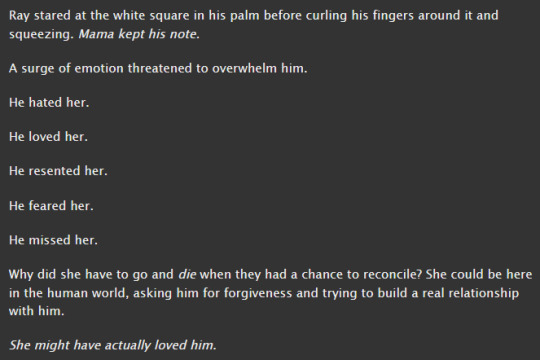
so the risk of using this information to encourage his younger siblings is too great to me.
[For how I think the immediate aftermath would play out in a scenario where she survived, see this post and this post.]
(Especially if the younger ones are still traumatized over losing Lucas and Yuugo I think it would be hard to seek out an parental attachments)
This is an interesting point though (to say nothing of how their mother was murdered in front of their eyes as well). People usually frame the kids moving in next to Alex's cabin in the post-canon around being healing for him given the family he lost, but the flip side of him being able to be a kind and unconditionally loving (grand)father in their lives after losing their previous parental figures is very heartwarming.
#ALEX BONDING MOMENTS WITH THE KIDS BESIDES EMMA WHEN#there's also salsae's AU where Mike Ratri becomes a father figure to the kids alongside him#which is equally fun to explore via her deft hand#guy is so versatile he can be a hero or villain for him in the human world I wish he was featured more#graphx#Long Post#FSS Asks#FSS Chatter#The Promised Neverland#Yakusoku no Neverland#TPN#TPN Fanfic#banana_slug_army#𝑆𝑢𝑛𝑠ℎ𝑖𝑛𝑒 𝑎𝑛𝑑 𝑆𝑜𝑙𝑎𝑐𝑒#Post-Canon#TPN AU#Post-Canon AU#No Reward AU#TPN Ray#TPN Isabella#Isabella and Ray's Incredibly Fraught and Complicated Relationship Tag#Ray#Isabella#Grace Field Kids#Pre-Canon#Escape Arc#TPN S1#TPN S1e09
11 notes
·
View notes
Text
The OC post
Last update: June 20, 2025
This is gonna be a long one, folks!
(if you want a TLDR on any characters or anything you can ask me and I'll do my best to provide lol)
This post contains pretty much everything you'll need to know about my OCs. Character profiles, references, plot summaries without getting too spoilery.
here's my toyhouse if you don't want to scroll through this post, it's easier to navigate and more organized)
If anything changes about my OCs, I'll update this post, it just might take me a while to do so.
Friendly reminder that: I love fan art, fanfics, I love headcanons, I love people kinning my OCs, all that good stuff! My asks are always open if you have questions. Please ask in fact. I like to talk
Escapism
Escapism is my gothic-horror-drama project that I plan to make into a comic/graphic novel. It takes place in 1880s-1890s England.
Warnings for; brief discussions of neglectful parenting, human experimentation, suicide, death, child loss and child death, implied ableism(infantilization), and homophobia.
See #buttersketch escapism for art, and #butterstalk escapism for text posts or rambles!
Some of the character descriptions might repeat parts of other descriptions. (Obviously) All their stories intertwine but I still want to have a relative idea of each character on their own if you were only looking at a specific one.
Summary
Escapism follows Aster Jones, a magician in an era in which any expression of magic is against the law. She stumbles upon two pseudo-scientist med-school dropouts who have dedicated their lives to secretly studying magic. She begins to live with the two, Beatrice Pho and Charles Taylor, and agrees to take part in their experiments and research, but they keep asking more and more of her. Charles is especially zealous, while Beatrice is doing her best to keep Aster and Charles happy and relatively sane.
Main Characters
Aster Jones
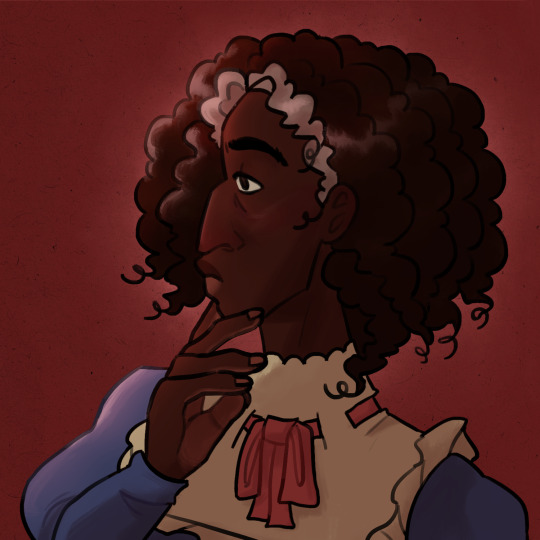
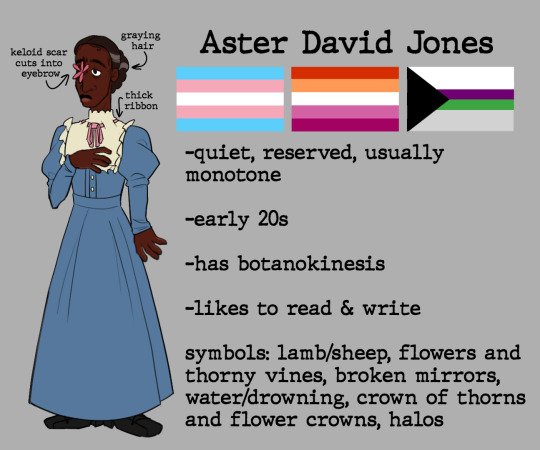
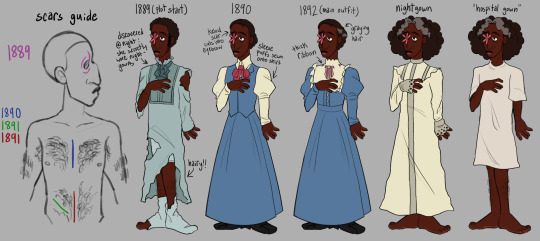
MTF, she/her • demiromantic demisexual lesbian • symbol: lamb
Aster's playlist - Aster & Beatrice's playlist - Aster & Charles' playlist - Manor Trio's playlist
Basics
Aster is very shy and prefers to stay quiet and reserved, only speaking when she finds it necessary. She's rather sheltered and doesn't trust easily. Though she's blunt and doesn't often let her guard down, once you get to know her she's a compassionate and gentle person who cares deeply about those close to her.
She enjoys reading and writing, her journals often being her only solace. She used to be a tailor and still makes her own clothes.
She has botanokinesis, the ability to control plants. She doesn't know the specifics of how her magic works, and doesn't necessarily care to know; it feels natural to her to use it, whether that entails sprouting flowers, shooting vines up from the ground in subconscious self-defense, restoring a withered garden, etc. It seems to be somewhat tied to her emotional state. The flowers occupying her left eye socket aren't any specific kind, although she can make a specific kind of flower, the pink kind she defaults to is just hers.
-----------------------------------
Backstory
Aster was born with roots in her left eye socket instead of an eyeball, plants sprouting out of it occasionally, meaning she was magic, which was incredibly illegal.
Aster was forbidden from leaving the house as a child, her parents not wanting the town to find out that she's magic, and was therefore incredibly lonely. One day when she was fifteen she left the house while her parents were at work to explore the town, her flowers hidden with bandages and with the story of an "oven fire accident" should anyone ask about it. She was unable to contain herself and unknowingly caused flowers to sprout wherever she went, leading the townspeople to realize she was magic. Long story short, Aster had to flee the town and never saw her family again.
She made her way into the next town over, Amberfield, as inconspicuously as she could. She was found by Eleanor Robins, a local tailor, who took her in and gave her a job. Aster worked as a tailor's apprentice (and eventually tailor) for four more years. She did her best to stay hidden, but was friendly to customers (for her own safety) and generally well-liked. Some time during that period she started wondering what she might look like wearing the dresses she was always making for other women and made herself a night gown that she wore in secret.
In 1889, Robins discovered Aster's magical nature, having walked in on her changing the bandages. Robins immediately went looking for the police after locking Aster inside her room. Aster, without any time to gather her belongings, escaped through a window and ran away into the woods.
After a month or so of wandering aimlessly, surviving only on what fruits and vegetables she had the energy to grow herself, she saw a light between the trees on a rainy night. She ran toward it and found a secluded manor in excellent condition, if not maybe a little neglected. She approached even though the flowers growing out of her face were obvious, she had no other choice; this could be her last chance at shelter for a while. She knocked, and a young man in grieving clothes named Charles and a cheerful girl his age named Beatrice answered, ecstatic at the sight of a magician, happy to offer Aster a home.
-----------------------------------
Story
Throughout the plot, Aster is put through various grueling medical trials and experiments, Charles obsessed with finding the "cause" of magic, Beatrice being his accomplice despite Aster and Beatrice's relationship. Aster has to fight for her life while facing betrayal, manipulation, guilt over her however-justifiable past actions, and her autonomy being ripped from her over and over again, whether that means being treated like a specimen or like a saint. But despite all that, she will continue to live. She will thrive, even if she has to wilt on the floor for a while. She makes sure of it.
Beatrice Pho
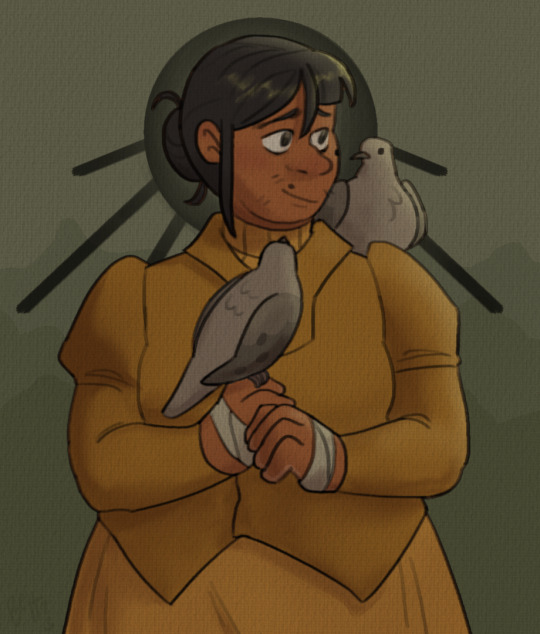
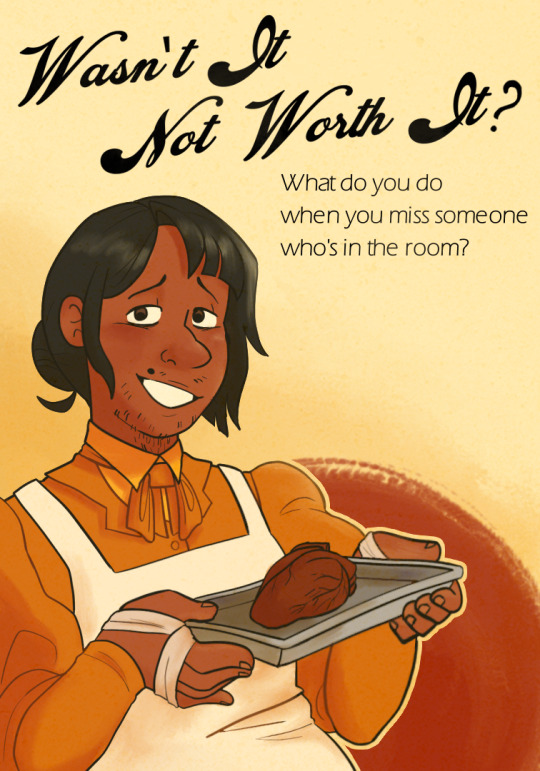
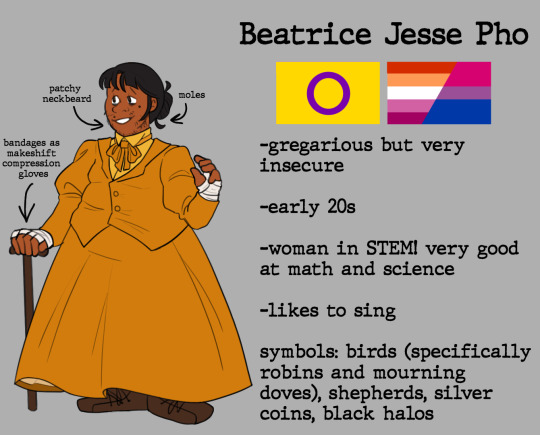
Intersex, female, she/her • bisexual lesbian • symbol: mourning dove (or birds in general)
Beatrice's playlist - Beatrice & Aster's playlist - Beatrice & Charles' playlist - Manor Trio playlist
Basics
Beatrice is charming, witty, and gregarious, but also very unsure of herself. She has a savior complex, putting others before her even in the most unnecessary situations to the point that it can upset those around her.
She grew up without many friends, outcast for her behaviors and interests, until she and Charles met when they were both ten. They became instant best friends and have been close ever since.
She has rheumatoid arthritis, and uses crutches or a cane.
She likes to stay busy with studying and research, but als0 enjoys reading plays and poetry; her and Charlie would act out scenes and poems together as children. And despite her insecurities about her skill, she loves to sing, and often does so while housekeeping.
-----------------------------------
Backstory
Beatrice was quite the trouble-maker as a teen, often sneaking out to see Charlie and take him to theaters or fairs, him always anxious about getting in trouble.
The two both had a fondness for science, and while exploring the back rooms of a library she definitely wasn't supposed to be in, Beatrice came across an old, ridiculously illegal book on magic. The information was almost guaranteed to be outdated and inaccurate, but she thought it was interesting. She showed it to Charles after sneaking into his room at the dead of night, and while he protested at looking at illegal material, once he did he became absolutely enthralled. The two decided to become surgeons and use their knowledge to secretly study magic on the side.
Beatrice and Charles went to the same university, but it was very far from home, it being the closest that would allow both men and women to attend. And even then, Beatrice cross-dressed once or twice to get into watching some live procedures (once again causing Charlie to worry about getting in trouble, but they never did).
The two studied at school for two years until Charlie got a letter informing him that his mother had passed away from illness. Beatrice was devastated along with Charlie, as the Taylors had become a second family to her. The two got on a train back home as soon as they could, but when they arrived they found the house completey empty. The two searched around the house for Charlie's father, only to find that he'd hung himself in his bedroom. Beatrice took Charles to his room (after he had promptly thrown up on the carpet) while she went out to find Winston, a groundskeeper and a trusted friend. He took care of most of the matters, wanting to spare Beatrice and Charles any more misery, but the two still had to organize and show up to the funeral.
Charles dragged his feet the whole way, resentful towards his father and angry at the whole situation. He was usually good at putting up a respectable-young-gentleman face while at social events, but he didn't have it in him to do so during the funeral. Beatrice was doing her best to keep him happy, to encourage him, to give him time to breathe and mourn, but he refused. He insisted they moved to the secluded Taylor Manor to study magic in private, unable to wait until finished with medical school anymore. Wanting to support her best friend, of course, Beatrice agreed.
A few months into their new home, a stranger in blue, drenched in rain and mud, knocks at their door. To their delight, it's a magician. Beatrice and Charles offer the magician, Aster Jones, a home at the manor, ecstatic at a new potential friend and resource.
-----------------------------------
Story
Beatrice is, first and foremost, Charles' best friend. She's been with him for everything and separating from him sounds completely implausible. Because of this, when Aster arrives and Charles gradually treats her worse and worse, Beatrice can rarely ever bring herself to interfere. Beatrice resorts to just comforting Aster, stitching up her wounds, replacing her bandages, etc. Beatrice genuinely does love Aster, and the two eventually form a romantic relationship, but that doesn't stop Beatrice from betraying Aster's trust per Charles' request for an experiment. It completely destroys Beatrice to do so, but again, it doesn't stop her. She can't disappoint her best friend. She's the only one he has. After six or so months of Aster refusing to see her because of the betrayal (that period of time I have dubbed Aster's hermit arc) and Beatrice becoming somewhat of a test subject herself, she slowly, very slowly, starts lowering her support of Charles. She still loves him, she still thinks he's a good person at heart, but over time she stops being as active as she once was in their research. Beatrice and Aster make up and become good friends again, eventually restoring their romantic relationship as well, as Beatrice does her best to break old habits.
Charles Taylor
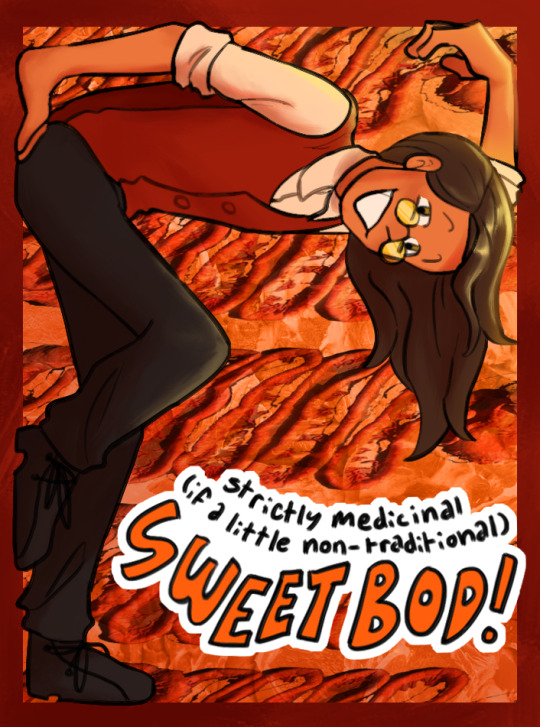
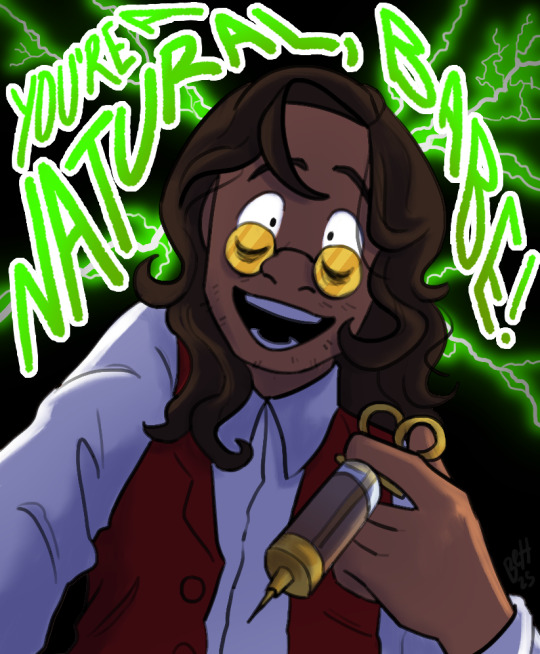
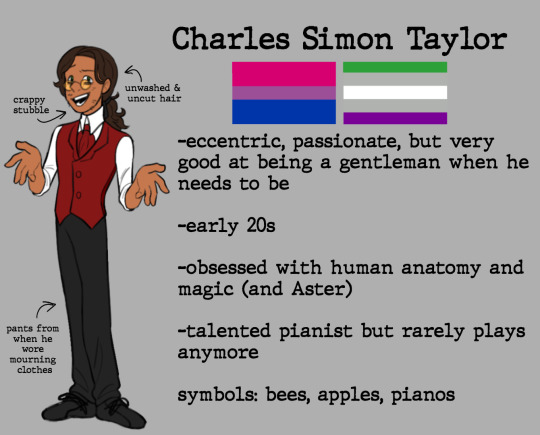
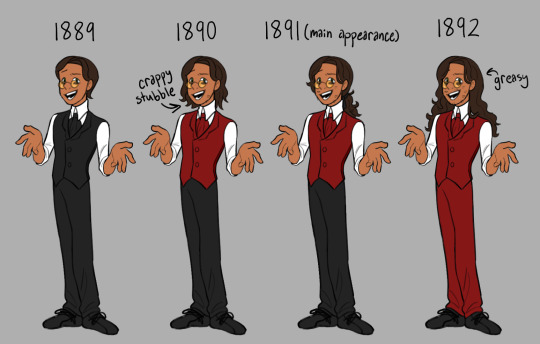
Male, he/him • grayromantic graysexual bi • symbol: bee
Charles' playlist - Charles & Beatrice's playlist - Charles & Aster's playlist - Manor Trio's playlist
Charles is a friendly and personable gentleman. To most. At his core, he's wildly eccentric and tends to get carried away with his passions and emotions, but he is a master at repression, so unless your name is Beatrice Pho, you wouldn't be able to tell. His greatest passion in life is human anatomy and physiology, or more specifically, magician anatomy and physiology.
Aside from his interest in science, Charles is also an incredibly gifted pianist, and dabbled in organ playing as a teenager. He refuses to play in front of anyone, save for his parents and maybe performing for guests when they could convince him to.
He grew up in a wealthy and loving family and though there were plenty of other kids his age around fairly often for social gatherings, he never felt himself truly connecting with anyone until he and Beatrice met when they were both ten and became instant best friends.
-----------------------------------
Backstory
Charles was a rather reserved child and in his free time would read for hours in his backyard, which is how he and Beatrice met; she had gotten lost while exploring some woodland and stumbled into Charles, and the two connected near-instantly over their shared interests.
The two both had a fondness for science, and one night Charles was awoken by Beatrice breaking into his room to show him a long-since outlawed book on "Faustian Anatomy" that she stole from the back rooms of a library. While at first Charles was horrified at the illegally-attained illegal book, after flipping through the pages his heart was set on the topic and he became obsessed with finding out as much as he could about magic.
Charles and Beatrice went to the same university, but it was very far from home, it being the closest that would allow both men and women to attend. Charles would often overwork himself and Beatrice would have to make him go to bed. He would learn to appreciate it.
The two studied at school for two years until Charles got a letter informing him that his mother had passed away from illness. The two were devastated, Charles practically frozen at the spot where he first read the news. Beatrice packed up most of their things and the two got on a train back home as soon as they could. When they arrived they found the house eerily empty. No groundskeepers, housekeepers, cooks, etc. to be found. The two searched around the house for Charles' father, only to find that he'd hung himself in his bedroom. Beatrice took Charles to his room while she went out to find the groundskeeper Winston whom took care of most of the matters related to Charles' parents' deaths but Charles still had to go through a lot of possessions and make sure everything was going to the right hands. He wanted to go away somewhere and act like nothing's happened. The process was agonizing for him.
Charles did not want to attend the funeral and told Beatrice it was a waste of time. She got him to though, eventually. He didn't have it in him to put up his gentleman persona this time, though. He refused to talk to anyone unless necessary and clung to Beatrice the entire time, his hand never leaving hers.
After the event was over, the two went back home. Beatrice laid down on a couch in the living room while Charles sat down at the piano. Beatrice was only a room away, so she could probably hear him, but this time, he didn't care. He played for hours, violently almost; the piano was practically out of tune once he was done.
When Beatrice heard the playing stop she approached Charles and asked what their next move would be. Charles had decided not to return to university, but instead to move to the secluded Taylor Manor so they could study magic privately; he didn't want to wait until they were done with med school anymore, now more aware that he had a time limit. Beatrice agreed and they set off for the manor.
A few months into their new home, a stranger in blue, drenched in rain and mud, knocks at their door. To their delight, it's a magician. Beatrice and Charles offer the magician, Aster Jones, a home at the manor, ecstatic at a new potential friend and resource.
-----------------------------------
Story
Charles is obsessed with doing something of notoriety with his studies. His passion for science is genuine, his love for how the human body works and behaves is real, but ultimately all of his actions are done hoping that they'll amount to something that will ensure his name will be regarded highly after his own death. He pushes not only himself, but Aster and Beatrice to doing more experiments, more intense procedures, he's desperate to find out anything about magic and he keeps hitting dead ends. Over the course of the story this desperation drives him further and further down the drain and into madness, but he never stops. He never admits to himself that he might be doing something wrong, even if he knows deep down, he keeps it deep down. And he does until his last breath, which comes sooner than he'd so desperately wanted.
Grace Williams
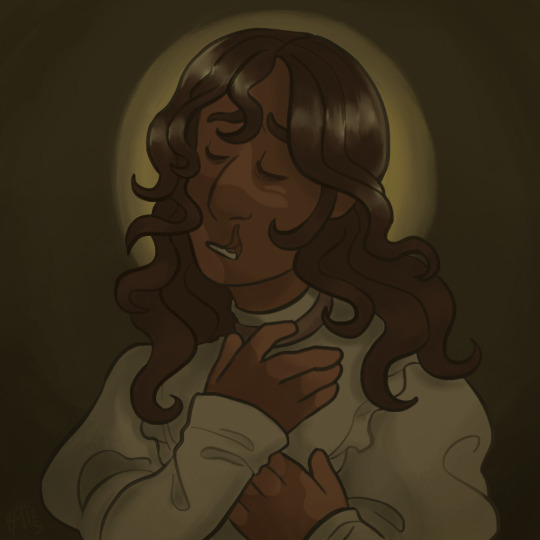
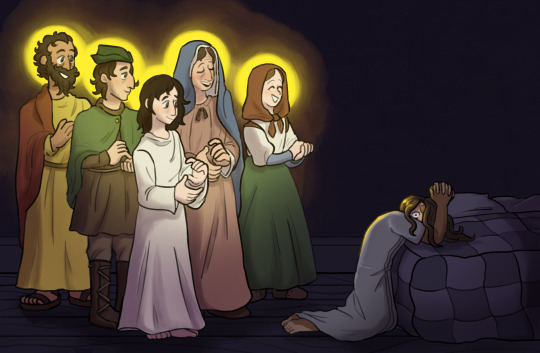
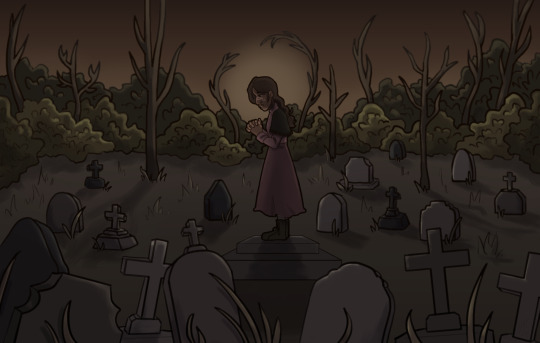
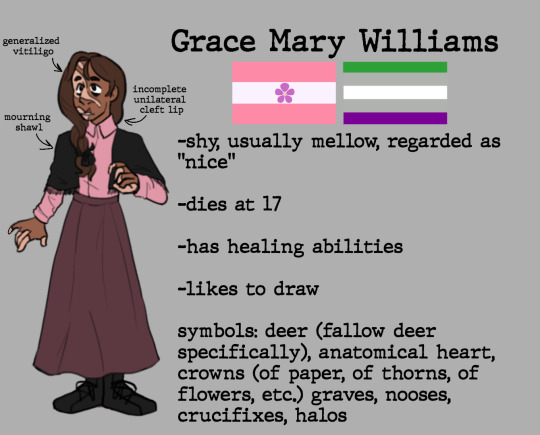
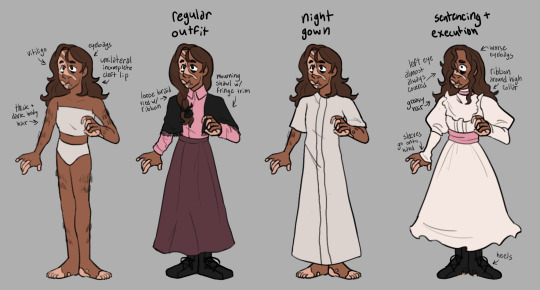
female, she/her • sapphic, grayromantic and grayace • symbol: fallow deer
Grace's playlist - City Trio's playlist
Basics
Grace is a kindly, reserved girl who has a tendency to stay on the sidelines. She's a bit of a wallflower; people don't really know her, but everyone agrees that she's "nice". Her default mood is mellow. She's grateful for her friends, Marty and Eli, as she struggles to believe she's worth anyone's time.
Grace possesses healing magic; she doesn't know the specifics of it, but it seems to only be effective on other people, and the worse the injury the more it takes out of Grace to heal. She often gets a sort of euphoria from performing her magic, though.
-----------------------------------
Backstory
Grace's brother Georgie died at fourteen when Grace was only four, and her mother Aria had been inconsolable ever since. Grace's father Daryl is struggling trying to support his wife and child both emotionally and financially, Aria unable to work. This left Grace feeling inadequate in comparison to Aria's glorified image of Georgie no matter what she did. Grace's mixed feelings on her mother wasn't helped by the fact that she sees (what she deems as) the worst parts of Aria in herself. Georgie's death also gave Grace a debilitating fear of death, intrusive thoughts about what lies beyond plaguing her near constantly.
Grace and Eli met when they were younger, maybe seven or so, and could connect over not fitting in with their peers, Eli being bullied (for various reasons) and Grace feeling sort of...stuck where she is. The two befriend Marty soon after, as they work at the same cannery Grace does, and was also alienated by the other kids. Marty can be a lot for Grace sometimes, but she can't help but admire Marty's compassion and pride, and over the years Grace and Marty fall in love (is it romantic? kind of! maybe! if you want it to be!).
Grace was happy to feel part of a group, however small, and Eli and Marty were always happy to distract Grace from whatever thought had pierced her mind at the time.
Despite Eli and Marty's good company, Grace still felt lonely and unfulfilled. That changed when one day, Marty's finger got caught in a piece of machinery at the cannery the two worked at, and was mangled terribly. Grace pulled them outside to a hidden alleyway and healed it. Grace had only fully realized that she was magic recently (she was thirteen at the time) and Marty was in awe at Grace's gift. They were convinced that God had blessed Grace, and was beyond thankful. Marty encouraged Grace to heal the next person who got into a factory accident, still keeping it secret, of course. While Grace was wary, she did the next time someone got hurt, and the praise felt so fulfilling. Grace was loved. She did something worthwhile.
So she continued. In secret, Grace would heal people. It spread beyond just the cannery, eventually complete strangers with ailments who had heard of a "girl in a mourning shawl" who could fix them. Grace was happy to help, of course. People shared Marty's sentiment that Grace had been gifted by the Lord, and Grace started to listen. She was at an all-time high, helping people and receiving so much love and affection in return.
Over time, more and more people started to approach Grace. Some people on the higher ends of the social ladder even invited Grace to their homes personally like she was a doctor, but otherwise, lines formed, and the crowds became larger; more difficult to hide in the alleyways and behind the factories. Marty saw this as a wonderful thing; all the people that Grace could save. Eli didn't speak up much, but he didn't seem happy. Grace, once again, felt stuck. It was becoming too much for her, but how could she deny these people the help they need?
She became irritable and started to feel that mellowness take over again. She wasn't sure if the person all the crowds were praising was even her.
Even though she had gotten the praise she wanted, she still felt hollow, now more than ever. She was always itching to do something, to run away and get out of her suffocating house with her mother rotting away inside it. She started praying more, as it always seemed to help Marty, but it only made her more scared. Grace was convinced someone or something was always out to get her, something just out of her sight. But everyone loved her. The crowds loved her. God and all the angels and all the saints loved her; she heard them say as much. She didn't understand why she was still so scared.
One day, she couldn't take it anymore and snapped, refusing to heal any more people for the day. One unknown person took offense to that and turned Grace in to the police, Grace being arrested in her front yard the next day.
Daryl brought Grace her nicest dress to wear to the court hearing, hoping there was some sort of chance for Grace to make a good impression and be spared.
The trial and sentencing was quick; Grace would be hanged on Wednesday morning the next week.
Grace was kept in a crowded cell with various other children, but she was the only one who was set to die. Eli and Marty would stack on top of each other to reach the small barred window and visit Grace the days before her execution. Marty knew they couldn't stomach to attend the execution, so they offered instead to play piano at the church across the way from the gallows; give Grace something nice to listen to, something to distract her. Grace accepted the offer, unsure whether it'd matter much.
The morning of Grace's execution came after a night of desperate, furious prayers and forced memories of her brother, trying to remember what he looked like. She was taken outside and led to the gallows. Eli was in the crowd watching the execution and tried to get Grace to focus on him, and told her to listen for the piano. As Grace mounted the steps, she managed to hear Marty's playing over the people. As the sack was put over her head she recognized the tune; "Amazing Grace". Of course Marty chose to play "Amazing Grace" for her. It was stupid and ridiculous, but Grace laughed. She was happy for that last moment.
-----------------------------------
Story
Grace is already on the steps to the gallows when Aster (the POV character) first sees her, but she has a great impact on the rest of the story. When Charles gets Aster to steal Grace's corpse with him (for research purposes) Aster is as careful as she can be, making sure Charles is handling the body gently, wanting to protect Grace even then. Marty glorifies Grace after her death and because of that Aster feels connected to Grace and grows a disdain for Marty. It doesn't last long, as Marty learns to be better, but Aster still feel like she owes Grace something, in some way. When Aster takes Marty home, she gives Grace some daffodils at her empty grave.
Marty Burke
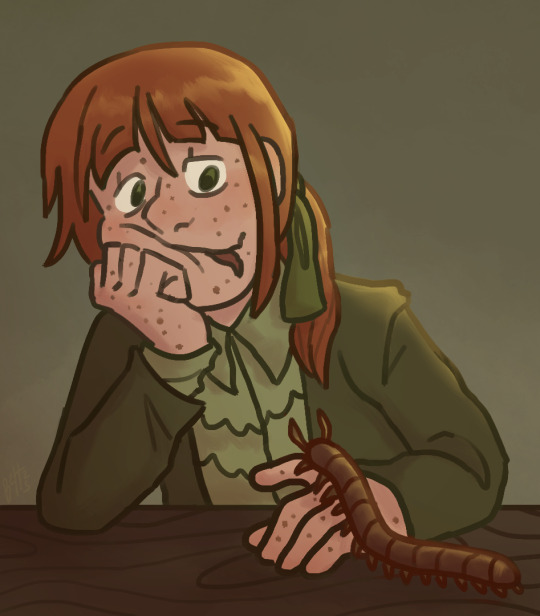
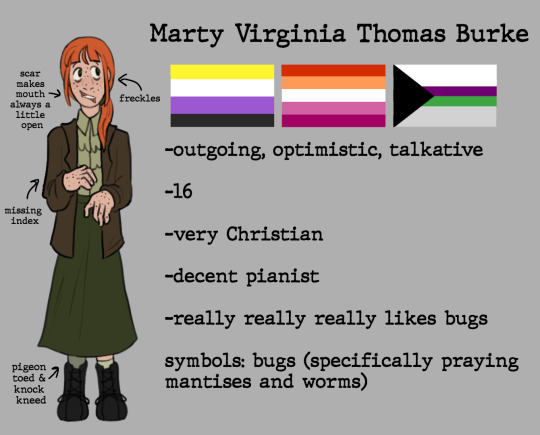
nonbinary, they/them • lesbian • symbol: praying mantis
Marty's playlist - City Trio's playlist
Basics
Marty is extremely outgoing and loves talking to people. However, they struggle to make friends for a handful of reasons; they're not good at controlling their volume, they're really into their "weird" interests, and they have an optimistic outlook on life, which people interpret as naivete, when in fact, they're incredibly responsible and rather mature. They're forgetful and scatter-brained, sure, but they take care of their five younger brothers and are a hard worker both at home and at the cannery.
Despite missing an index finger, Marty enjoys playing piano, and often does for church services. All they know how to play are hymns, but that's fine by them.
-----------------------------------
Backstory
Marty is the oldest child in a family of eight; two parents, six children. Marty often had to help with their brothers, and they were happy to do so. It could overwhelm them easily, though, so the second-oldest (Archie) got used to helping around too.
Marty was raised in an extremely Christian household, and they have a good relationship with their faith that doesn't falter all that much, even though their interpretation of their religion doesn't always line up with their peers'. Marty couldn't imagine their God hating anyone for loving someone, especially someone as wonderful as their partner Grace, and their mind wasn't budging on that fact. And even if they don't quite understand certain parts of themself yet, Marty knows that their relationship with their gender isn't one their community would be fond of. Of course, that didn't stop Marty from feeling awful about how people used their religion to justify hate, but it was more confused frustration than anything.
Marty has two friends (the other kids unwilling to even feign an acquaintance with them), Eli and Grace, and they're all extremely close, sharing everything with each other and spending every free minute they have exploring the city.
When Grace revealed to Marty she was magic via healing Marty's mangled index, Marty told her that it was a blessing from God. They thought it was wondrous, and encouraged Grace to share her gift with the other kids in need. Marty helped to keep Grace's magic a secret and would always find secluded spots for Grace to heal people at. They was ecstatic to see Grace happy and fulfilled, it being a rare occurrence in Grace's life. Marty a was so caught up in their admiration and love for Grace that they hardly saw a problem when the crowds of people wanting to be healed started growing bigger. It came as a complete shock to them when Grace blew up that fateful day and refused to heal any more people. Marty wanted so desperately to console her, to apologize for unwittingly pushing her to the brink, but Grace had fled from the scene before Marty had the chance.
A day later, Grace was arrested. Marty hardly got to see her before the whole ordeal went down, having to return to work with this unprocessed knowledge of Grace's detainment weighing on their mind.
Marty and Eli snuck out every night to visit Grace at the jail, checking up on her, getting updates. The night that Grace's death sentence had been announced, Marty could barely speak, but they offered to play the piano at the church across the way from the gallows to give Grace something to distract herself with as she walked towards her doom. Grace accepted.
The night before Grace's execution, Marty could only apologize. Over and over again, sobbing, apologizing for doing this to Grace. Grace didn't know how to respond.
When Eli and Marty were walking home after that night, Eli suddenly started shouting at Marty about how it was all their fault and how Grace would be dead by tomorrow because of them. Marty internalized it, they'd practically already admitted guilt themself, but that didn't stop them from breaking into tears again. They felt awful that Eli was the one comforting them once he felt bad for yelling. They didn't deserve his mercy.
The morning of Grace's death, Eli walked Marty to the church and told them to pick something good to play before walking off to attend the execution. Marty had already picked the song; "Amazing Grace". They knew it by heart, and hoped it might make Grace laugh.
Eli returned later that morning to tell Marty it was done. The two huddled on the floor of the empty church, unsure of what to do next.
That night, Marty couldn't sleep, of course. Their house was close to the church, and they could see the gallows out their window if they wanted to, but Eli made them promise they wouldn't look. He said Grace's body was being temporarily left up as an example. Marty obeyed his request until they heard something coming from where the gallows would be; poorly hushed arguing and the creaks of the wooden stairs. Marty impulsively looked to see who was there. They saw two silhouettes; a cloaked man and woman, stealing Grace's corpse. Without thinking, Marty dashed out the window and ran as fast as they could to the gallows to stop them. When Marty accidentally let it slip that they were close with Grace, the man grew excited and insisted Marty go with him, one Charles Taylor, and his companion Aster Jones, back to their manor so Marty could give them information on Grace. Marty was, strangely calmly and gently, blackmailed and threatened into agreeing.
-----------------------------------
Story
Marty first appears to Aster (the POV character) when they stop her and Charles at the gallows. When they're taken back to the manor, Marty glorifies Grace after her death and because of that Aster feels connected to Grace and grows a disdain for Marty. It doesn't last long, as Marty learns the error of their ways as they get to know Aster and Beatrice.
Marty immediately felt a connection to Beatrice upon first seeing her in the manor; she wore masculine clothes, she liked girls, she would talk a lot and was sort of scrambled like Marty was, but no one was upset at her for it. Though Aster wasn't fond of Marty for a while, Marty could relate to how she would tend to isolate herself, and despite even that, the two connected over time as Marty learned to grieve and appreciate Grace for the regular girl she was.
Beatrice homeschools Marty to the best of her ability, and Marty is ecstatic to finally be able to read about bugs and the Bible. They're not a fan of math, but everything else is very fun for them.
As part of an experiment, Charles (who at this point is rarely seen outside his study or the lab) dismembers Marty's other index as well as his own to compare how they each heal, as Marty's first lost index was healed with magic, Charles theorizing the magic may still have an influence on them and affect the healing process of the second lost index, and his own finger functions as a control sample.
While Marty is terrified of Charles, he seems to want their respect and thinks his "accomplishments" are impressive. He shares some traits with Marty, both of them even playing piano, but they're determined to not end up like him, which is another factor in them learning not to idolize Grace as Charles idolizes Aster.
Elijah "Eli" Abrams
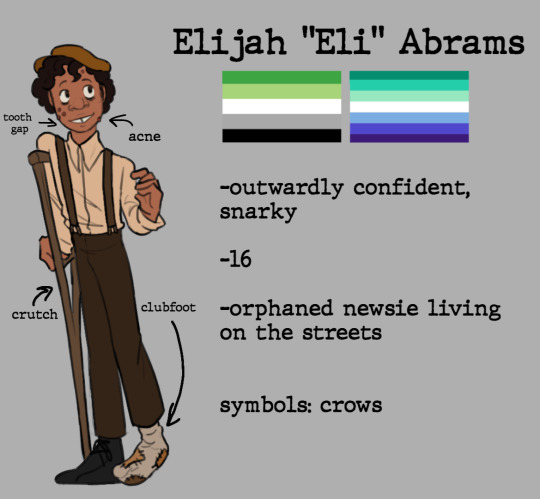
male, they/he • aromantic gay • symbol: crow
Eli's playlist - City Trio's playlist
Basics
Eli is snarky, outwardly confident in himself and has pride in his resilience. He grew up on the streets, orphaned as a child, and has worked as a newsie all his life. As much as the other news boys pick on him, they're the closest thing he has to a family and is somewhat grateful for them. They all have each other's backs when it comes down to it, but that doesn't always spare Eli from some vicious bullying, and he struggles to call them friends.
Eli doesn't have the time or money for any real hobbies, but he is a natural-born performer, which makes him a great newsie. He likes sneaking into theaters and vaudeville shows when he can.
-----------------------------------
Backstory
Eli doesn't remember much of his parents and doesn't care to all that much. He's got a steady enough living now.
Eli met Grace when they were both seven or so, and as they grew Eli felt like he had a responsibility to take her under his wing; god knows her parents weren't taking enough care of her. But, he still needed to keep up his snarky and uncaring front, so he avoided getting too clingy. The two befriended Marty later on and they all became extremely close.
Eli was the most worried about Grace when she started performing magic for people other than themself and Marty. He knew more than anyone how quickly someone's life can be cut short; he can't count the amount of lifeless bodies he's walked past, and he's woken up to a dead newsie slumped next to him more than once. He just wants to keep him and his friends under the radar long enough to make it to adulthood. But when he saw how happy it made Grace to help people and to be loved in return- he couldn't take that away from her. So he stood by the sidelines as the crowds got bigger and more demanding. Marty noticed he was starting to keep his distance, but they didn't know what that meant, so they continued to encourage Grace to use her gift to help people.
When Grace finally broke and refused to heal any more people, Eli was shocked, but he'd be lying if he said he didn't relish it. He was excited that Grace was finally standing up for herself, but of course, that triumph didn't last long.
When Grace was arrested and sentenced to death for her magic, Eli was furious. The night before Grace's death Eli blew up at Marty, shouting at them that it was all their fault. Partially because they were the only person around, but a big part of him really did blame them. He knew it wasn't their intention, he knew they just wanted the world to see the beauty that they saw in Grace, but did their intention really matter? Grace was dead all the same. Eli didn't know. He hugged and consoled Marty when they started crying after his outburst. He walked them home and promised to walk them to church tomorrow morning before Grace's death.
-----------------------------------
Story
Eli is absent for most of the remaining plot, after Marty was taken away to the manor to be used as a resource for information on Grace. Eli didn't know that, though. All he knows now is that both of his only friends were gone. He mourns as much as he can without looking "weak." He visits Grace's family and gets to know them a little better. He tries to do so with Marty's family, but her mother doesn't like him very much, so the most he can do is greet Marty's brothers in the morning and offer to help tie their shoes or straighten their vests.
Eventually, when Marty does return however many months later, Eli is of course overjoyed and postpones any work he had for the day, instead celebrating with them and filling them in on what's happened, even introducing Aster to Marty and Grace's respective families. He and Marty talk a lot about what happened in the time they were separated, and he thinks Marty having their own dismembered finger in a jar is pretty rad. He visits Marty a lot more, whether their mother wants him there or not, and always greets the jar with Grace's heart in it resting in a hidden corner of Marty's room.
Side Characters
George "Georgie" Williams
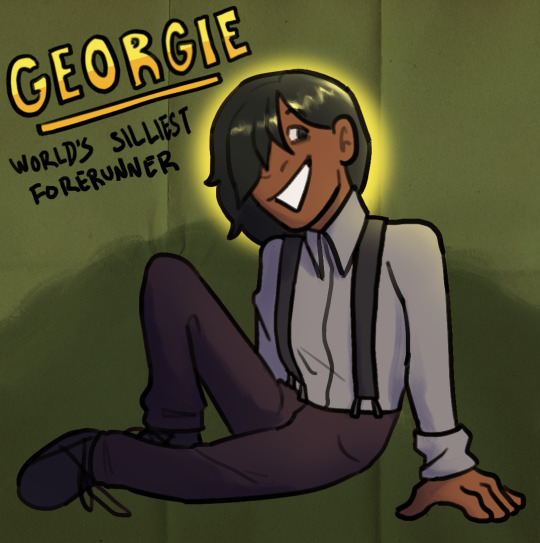
Grace's dead older brother. He died when Grace was very young, so she doesn't remember much about him, but she thinks about him a lot.
Elizabeth & Clarence Jones
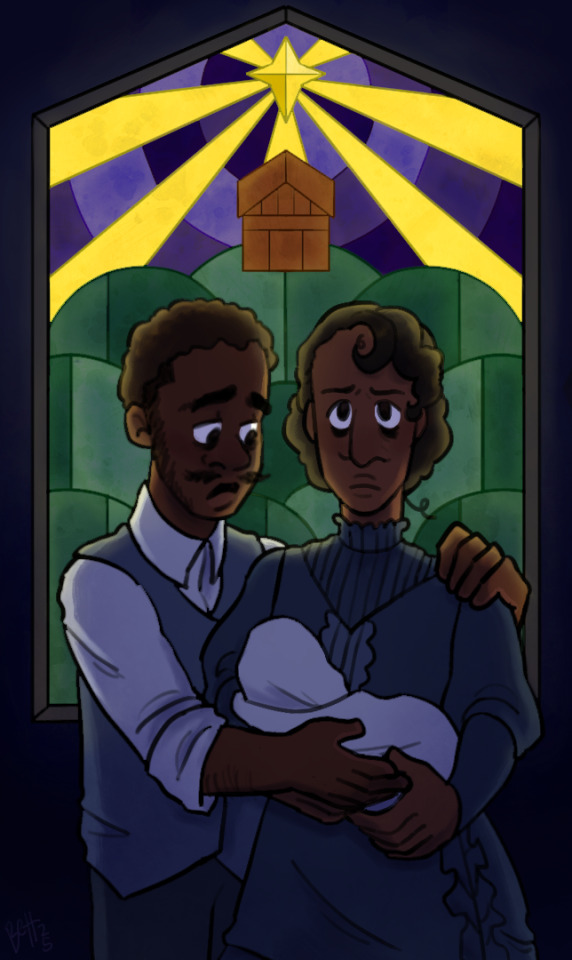
Aster's parents. They both love Aster more than they can express and protect her from the world at all costs, terrified of what would happen to her.
Jeanette & Walter Pho
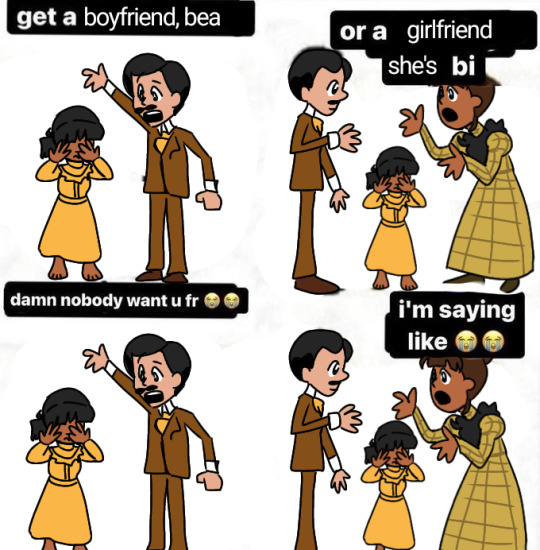
Beatrice's parents. Supportive and loving, if a bit ignorant. They are each other's best friend.
Morgan & Henry Taylor
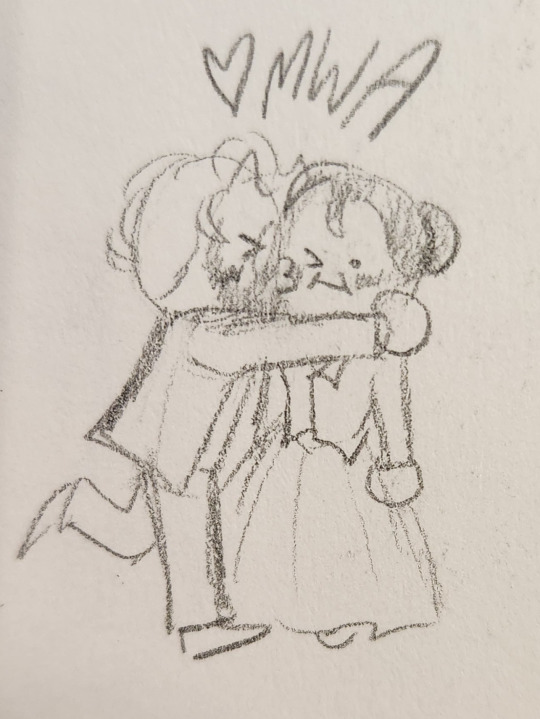
Charles' parents. They are hopelessly in love with each other. Morgan was an intellectual and had a special love for ecology. Her love for science rubbed off a bit on Charles. Henry is much more business-minded, keeping up finances to support his wife and child's endeavors. Morgan died of illness when Charles was 18, and Henry took his own life a few weeks later while Charles and Beatrice were still making their way back home.
Aria & Daryl Williams
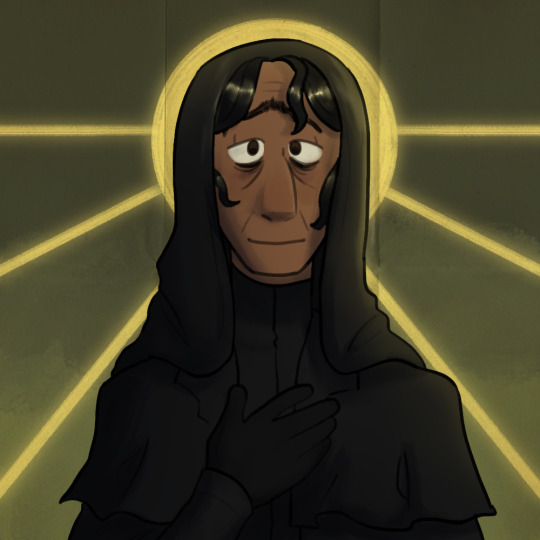
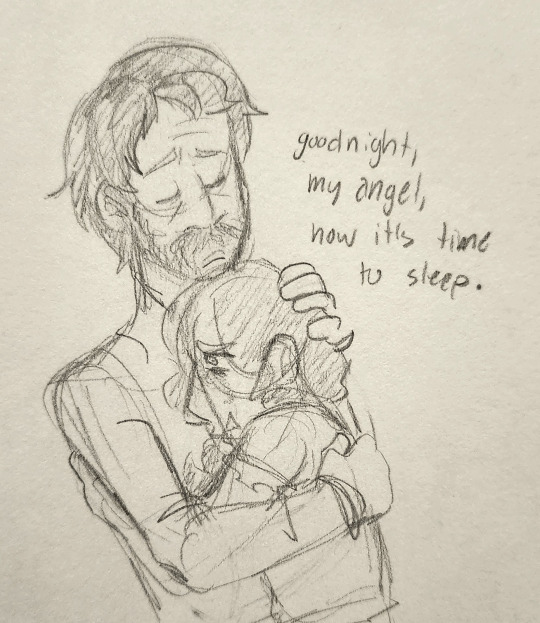
Aria is constantly suffocated by grief. When her first child Georgie died in her arms due to a factory accident, she essentially became a hermit, finding herself unfit to work anymore, and instead staying at home with the curtains drawn, only ever wearing mourning clothes. That, along with the grief from a miscarriage she had before Grace was born, made it hard for her to connect with her remaining daughter, despite how much the two had in common. Because of this neglect, Aria blames herself for Grace's death. She should have been there to protect Grace, but she failed yet another one of her children.
While she makes it near impossible to do so, once you get to know Aria you'd find that even though she can be snappy and a little all over the place, she is a kind and deeply compassionate person.
Daryl is Grace's father. He's a hard working man and cherishes his family; he does his best to emotionally and financially support his wife and daughter while being busy with work on top of trying to give himself some time to mourn his children himself, trying not to be consumed by his grief like Aria. He and Aria become closer after Grace's death, Daryl getting a proper break and people like Eli visiting to try and support the two.
Ella & Samuel "Sam" Burke
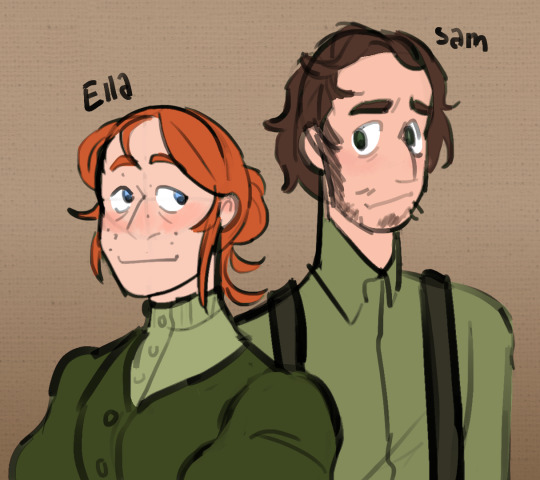
Marty's parents. Tight-laced and try to look more hoity-toity than they are.
Winston
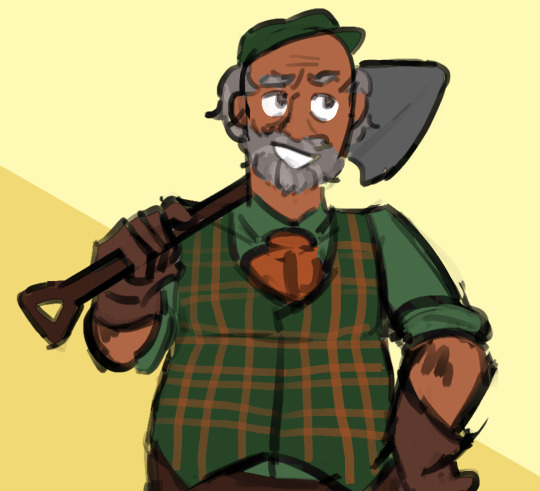
Winston was the groundskeeper at the Taylor estate. He considers himself a friend of the Taylors and Phos; when Charles and Beatrice were children he would teach them about maintaining a garden and show them the best spots to find worms. He will not tell you his full name. He has genuinely no reason why, he simply likes being just "Winston."
that's it for Escapism! thanks for reading this far!
------------------------------------------------------------------------------
Bad Decision (formerly "Dawn")
Bad Decision(working title) is my midwestern-survival-horror project I want to turn into a game.
It is super under development; nothing is set in stone and the lore and characters are changing near constantly. I'll post concept art every now and again, but don't expect much consistency or for anything to be coherent.
You can go to #buttersketch bad decision for art related to the project.
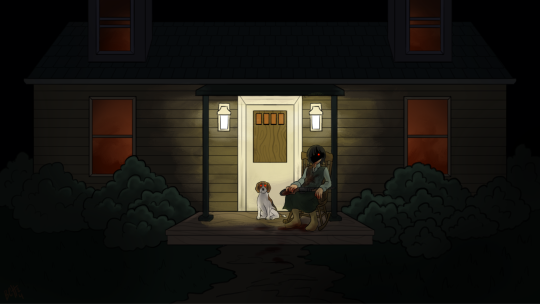
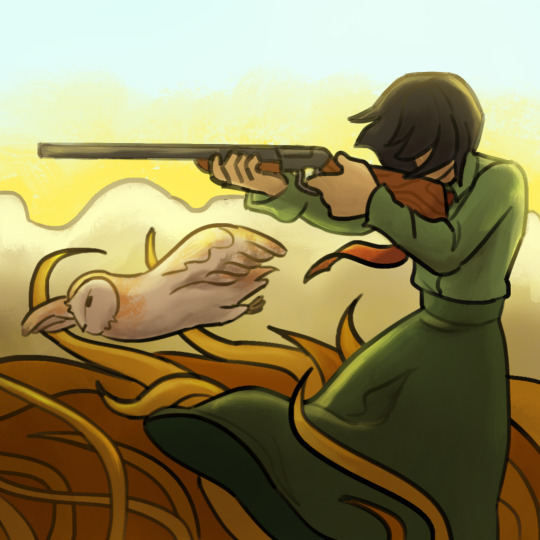
That's about everything!
Thank you so very much for reading all the way to the end, it means the world to me. Reminder again I'm always happy to answer questions. Have a good day!
-bett
13 notes
·
View notes
Text
Seraph of the end trauma rant pt2 :3
So, I’m back. Not at midnight for once :0
I made the pt1, and I have more ideas. SO today will be (probably) the only other part.
With Yuu, Shinoa, Mitsuba, and Narumi :3
TW: Death, murder, suicide,
Okay, starting off strong with the main character Yuu. He is probably focused on the most, both him and his trauma, so I won’t cover too much. However, I feel like the survivors guilt aspect isn’t shown as much as it could. Like how he felt so guilty about leaving Mika those years ago, even though Mika repeatedly tells him it’s fine. I just feel that could have been shown more. Also the whole thing with his dad trying to kill him and mum committing because she hated Yuu so much??? He has to be conscious about that, and clearly we need more on his reaction and mental state due to it.
Okay! Shinoa now! ;3 She’s the youngest of the most important family in the JIDA, and still ditched the army for Yuu. That has to be lots of pressure, and she still left. That takes guts, or zero impulse control, or both. She lost her sister, but we never really get to see much about that, exercise for Mahiru and Guren, but nothing much about their sisterly bond (if they had one). She had to hide all of the knowledge about the experimentation from the squad, and especially Yuu, which must have been eating her alive.
Okay, Mitsubaaaa :) She has lots to unpack, but I’ll keep it short. She is also a member of a pretty important family in the JIDA, and her sister and her don’t have a great relationship. Her sister, Aoi, works close with Kureto, so (if I were her at least) the guilt she must feel about the Seraph of the End experiment, especially since it was on her squad-mates sister, but be intense. She ALSO feels responsible for the death of her old squad, and watch them get killed. Again, survivors guilt and guilt in general. And then there’s also the fact that the JIDA tried to promote her rank, just because she of her family. I know that being judged on your family can suck, and she said it herself that it she gets a promotion, she wants it to be because of her work specifically.
Rounding off this rant we have the fabulous Narumi. Right off the bat I can say that, as someone three years older than Shinoa Squad, he already probably feels accountable and responsible for them and their safety. And then the poor guy had to watch his whole squad murdered in the space of a few hours. Idk abt y’all, but the scene in Shinjuku broke me, and then Nagoya added salt to the wound. The look on his face after Shinjuku…and then how he didn’t get any time to mourn because of Nagoya, where he lost MORE friends and squad mates, and then he didn’t get to grieve then either because he had to keep fighting, then protect Yuu, then run away.
In summary, for both pt1 and pt2: these poor guys are only teenagers and are going through some really tough shit. Get them therapy, or at least blankets, a warm drink, and cuddles. Because holy fuck they need them.
Thank you for coming to my Ted Talk(s) :3
#seraph of the end#owari no seraph#narumi makoto#shinoa hiiragi#shinoa squad#mitsuba sangu#yuuichirou hyakuya#seraph of the gay
8 notes
·
View notes
Text
This essay seeks to discuss the understanding of health, illness and death with reference to sociological theories of Marx’s alienation, Durkheim’s theory on suicide and types of suicide and Freud’s analysis on Hysteria. Marx suggests that we must go into social connections to attain to how we drink, dress and house ourselves (Morrison 1995). An examination of history uncovers the type of those social connections. Durkheims study was helpful in light of the fact that it built a particularly sociological perspective of an individual in reaction to the collective, it clarifies distinctive rates of suicide in diverse nations by citing their crucial societal attributes. Freud is almost in sync with Marx’s view of social connections. The environmental or social impact on the child develops the personality. The outcome is that they wind up composing a Whig-history they could call their own calling, focusing on genuine therapeutic leaps forward. It seems as if it is a strategy to evade the critique on history. So everything gets justified under concepts such as enlightenment or the greater good. Three core concepts define Marx’s ideology (Marx and Engels 1970): Material Conditions; To comprehend our experience as people we must start with establishing that involvement in the material states of regular life. Dialectical Materialism; Those material states of ordinary life are portrayed by clashing social powers, the result of which "decides" our encounters. Alienation; A consequence of our current material states of life is that we are estranged from our human self, from one another and from the way of work. These concepts lead us to think about human wellbeing with full comprehension, which includes an investigation of the material states of living and its consequences for wellbeing and disease. Further, these imply that the societal effect shapes those material conditions bringing about estranging encounters and practices that lead individuals to settle on undesirable ways of life decisions (Morrison, 1995, p. 32-40). What Karl Marx has accomplished is put together a comprehensive and fascinating vision that can endure the experimental contradictions. In a few words the concept of Marxism takes the essence of the complexity of the world, divides it into responding components and then justifies it. To find a loophole in the Marxist theory is hard because the criticism would label the components as a moral. In the social generation of their presence, men unavoidably go into positive relations, which are autonomous of their will. To be specific, relations of creation that is proper to a given stage in the advancement of their material powers of creation. The totality of these relations of creation constitutes the monetary structure of society, the genuine establishment, which emerges a legitimate and political superstructure and clear types of social awareness. An examination of history uncovers the types of social connections (the serf-master, the working people bourgeoisie) that exist in a specific monetary mode of generation (preagrarian, medieval and afterward entrepreneur). It is the mode of creation, at present free enterprise, that "decides" the type of social connections, and the ways we think. In this manner the primitive serf-master relationship was cleared away with the ascent of modern free enterprise, it basically couldnt exist as a prevailing method for sorting out social life (Marx, 1859). Marx’s take on wellbeing may propose (Mazlish, 1987): Poverty is currently acknowledged as connected to wellbeing; however frequently denied by any society that has inequality in income. Material states of life have a causal relationship to wellbeing and sickness. Subsequently to enhance wellbeing results, enhance material conditions. Social and political reasons for sickness and illness have been disregarded and under inquired about. Once individuals lose financial helpfulness their quality drops and their wellbeing needs are inadequately served. Research into wellbeing needs might disproportionally support the wellbeing needs of rich social orders and the well-off in princely social orders on the grounds that it is the place the speculation returns are. Health administrations may be about keeping laborers as gainful and as financially dynamic as could be allowed Read the full article
0 notes
Text

*Understanding Death Threats Against Human Rights Defenders*
Years ago when I began writing about my experiences, with then one book while monitored and brutally beam assaulted by military personnel and cops, I was told by the AA cops, "If you stop what you are doing, we will leave you alone." Today, 18 years later the threat, repeatedly, "If you don't stop what you are doing, we are going to get your daughter!"
Several times, after such a threat, this prompts a call from one of my daughters, which they anticipate, in another state speaking of frightening occurences. One, detailed someone laying in wait for her to arrive in the parking garage with a menacing stare who then followed her into the building, someone knocking on the door several times with no one there, and around 3:00 a.m. someone outside tampering with the lock appearing as if a break end. I sent a special lock for this. Recently the oldest of the three, in the mist of these ongoing threats to me, who lives in another state also reported the exact same type of lock tampering in the wee hours of the morning and was sent a special lock too.
This is no coincidence. The official involved, have concocted a game plan designed to scare me by threating my children and strategically backing it up.
In fact, each and every time I visit from California, military personnel arrived and setup in adjoining apartments. This includes FBI agents following us to one of my daughter's graduation including following us on a Christmas family outing train ride to the North Pole for two granddaughters. At that time several FBI agents, three men and two women showed up and sat right next to us and just watched me making comments to let me know who they were.
As the truth snowballs nationwide and globally, this hideous, official program is having a difficult time keeping the lid on the lies and coverup of the official high-tech horrors being committed. This experimentation is part of subjugation and the high-tech population control agenda, that is covertly advancing psychophysical, mind invasive, psychotronic patented weapon systems and devices, backed by Directed Energy Weapons torture, monstrously, covertly, targeting anyone, men, women and children when useful.
Specific to the AA cops, who reported long ago, "This is our case" while torturing me and trained on military weapon systems and military drones, they are even more desperate knowing they will be the first out of a job with their effort approved by their official supervisors who essentially are their Handlers.
Come what may, even as one of my daughters, a college educated Social Worker, suddenly is beamed the depression beam, again after threats to suicide her, I will stand.
There are far better people on this planet, of all races, than those involved in this program!
0 notes
Text
Week 1 - Assignment: Examine Personal Beliefs Related to Substance Abuse
Week 1 - Assignment: Examine Personal Beliefs Related to Substance Abuse
Zachary Gaboriault
National University
PSYC-6110 V3
Dr. John Mitchell
April 16, 2023
Substance use and abuse has been a sore topic for me. I was surrounded by substance abuse from a young age and continued to watch it consume members of my family and friend group, including several ex-girlfriends, mother, two aunts, and more. It took many years to learn and come to terms with this fact and, although it was initially a sad reality for me at such a young age, I came to learn what addiction was at a young age. In this regard I suppose it prepared me for the temptations of teenage and early adulthood because I was already armed with knowledge of what substance use and abuse looked like, how it progressed, and what the end-stage looks like. Over the course of this blog entry, I will seek to define substance abuse, as well as answer the following questions:
What is meant by the statement that substance abuse occurs on a continuum? Do you accept this idea, or do you think that there are fundamentally different characteristics that separate substance use from substance abuse or addiction?
The costs of substance use disorders in society are significant. What are some of the specific contributing factors that are behind some of these costs?
Do you think that the problem of substance abuse is blown out of proportion by the media, or perhaps underreported? Explain your position.
It is my hope that this blog entry not only be informative but be a cautionary tale for those who have wondered these same questions as well as those who have dealt or are currently dealing with substance abuse in their family/friend group. Frequent substance use and abuse are overall very dangerous and we shall discuss further details as we progress.
So, what exactly is substance abuse? More commonly referred to as drug abuse, the term substance abuse refers to an individual’s usage of legal or illegal products that are detrimental to one’s health in order to achieve an altered physical and/or mental state. Methods usually vary between breathing them in, snorting them up the nose or injecting them into the bloodstream (Wulffson, R. L., MD. 2022). The list of substances is long and can range anywhere from readily available substances, like caffeine, nicotine or over-the-counter medications like ibuprofen, to more deadly substances such as cocaine or heroin. Substance use occurs on a spectrum that starts with non-use. The end of the spectrum would be categorized as the opposite of non-use, which is dependent use, meaning the individual abuses the substance compulsively and requires it in order to avoid withdrawal symptoms. In-between these stages, and in order of severity, include experimental use (where somebody is curious about the effects of using it but is unsure), recreational use (where somebody is utilizing a substance recreationally and mostly situationally, like drinking alcohol or taking drugs only before they go to a nightclub), and regular use (where somebody ingests a substance on a scheduled basis, such as always drinking on a Friday night after receiving a paycheck) (2). This idea is one that I accept and makes sense, both on paper and in real-life situations I have observed. A particular situation I witnessed was a friend of mine was curious about ecstacy after becoming involved in the nightclub scene and began using it every time they went to the club, thus constituting recreational use. Even with this recreational use though, the next-day side-effects were quite severe and often included feelings of depression, fatigue and suicidal thoughts.
When someone is diagnosed with a substance use disorder (a.k.a drug addiction) there is no cure for it, as there would be a cure for a physical wound you treat with antibiotics and a bandage. Substance use disorder requires treatment that can take months or even years and can be something that the diagnosed person has to deal with for the rest of their life. This is where treatment for a substance use disorder can become costly because the diagnosed person must meet with licensed professionals who can diagnose them, treat them, and sometimes prescribe them medication to help in the process of becoming sober. Many people diagnosed with a substance use disorder find relief in behavior therapy, which attempts to get to the root of their maladaptive behaviors but requires many sessions before real progress can be made (Spiegler, M. D. 2023). There are some free options when it comes to obtaining some form of therapy, including peer-support groups like Alcoholics Anonymous, but attaining sobriety has a higher success rate when multiple methods are combined that includes therapy, support groups and medication if necessary.
When it comes to how media reports topics such as substance use and abuse, in my opinion, a lot of the articles are accompanied with titles that almost come across as clickbait. Many mainstream media sources try their best to maximize their reach and views, so a clickbait title that grabs your attention and makes you want to read it is their goal. It would seem that is their only goal though, as most reporting of substance use and abuse do not offer honest reporting that includes helpful information and resources people can use to get help, but rather include politics and scare tactics that benefit them, not the reader. This only works to increase the stigma surrounding mental health and mental health disorders, the larger umbrellas that substance use disorders fall under. In general, individuals struggling with mental health issues like substance use disorder feel embarrassed talking about it and seeking treatment, because they are afraid to be perceived as weak by their friends and family. In fact, in the year 2020 only 46.2% of Americans diagnosed with a mental illness received treatment for it (Harmon, A. 2023). We should all be working together to eliminate the stigma of seeking and obtaining treatment for mental illness across the board.
References
Continuum of Substance Use and Abuse -. (2020, October 8). https://alcoholrehab.com/drug addiction/continuum-of-substance-use-and-abuse/
Harmon, A. (2023). Mental health stigma . Salem Press Encyclopedia of Health.
Spiegler, M. D. (2023). Behavior therapy. Salem Press Encyclopedia of Health
Wulffson, R. L., MD. (2022). Substance abuse. Salem Press Encyclopedia of Health.
#mental health#mental health awareness#substance use#substance abuse#substance use disorder#psychology#stigma#end the stigma#end mental health stigma
16 notes
·
View notes
Text
AI The Somnium Files: Nirvana Initiative Trigger/Content Warnings
Hello! I haven't seen a comprehensive trigger/content warnings list on Nirvana Initiative, so I figured I’d make my own! Some warnings contain slight spoilers, but I tried being as vague as possible. Please read at your own discretion. If I’m missing anything in this list, please feel free to dm me!

Decapitation
The game centers around the mystery behind one half of someone’s body being found without any traces of the left half.
Unreality
Ryuki frequently dissociates when under stress or in exposure to videos via a QR code.
A frequent theme in the game is Naixatloz’s ideology, which centers around the idea that the world is a simulation and that they are aware that they're in a video game. There are frequent mentions of conspiracy theories.
Murder/Death
This is a murder mystery game so death is expected. Mentions of rigor mortis.
Blood
This game has very little gore compared to the first game but it's still worth mentioning.
Age Gaps/Pedophilia
A character named Lien, who is 22 years old before the timeskip, shows interest in an 18 year old high schooler (Kizuna). After the six year timeskip, they get into a relationship, but it is still considered weird because Lien met her when she was 18 and still in high school.
Moma and Ota continue to make weird advances towards Iris, both before and after the timeskip.
Tama makes constant jokes about Shoma, a 12 year old, wearing a chastity belt.
Constant sexual innuendos are made towards Mizuki, both before and after the timeskip, concerning her chest and her bullet wound.
Tearer shows romantic interest in Amame, who he meets when he is 29 years old and she is 18.
Incest
Gen shows romantic interest in Amame despite considering her a daughter. He also seems to be much older than her.
Hospitals
You visit one a few times and other characters are mentioned to be there.
There are hospital tools in the Masked Woman’s Somnium.
Ableism
Kizuna feels guilty for becoming disabled because she can no longer dance. Lien blames himself for this as well.
Usage of the terms “narcissism/narcissistic” to refer to selfish people/people without NPD.
Human Experimentation
An organization is revealed to experiment on children, specifically those part of the main cast. This includes facial augmentation, increased strength, and permanent youth. It’s mostly mentioned, but there is a Somnium that emphasizes how heavy the situation is, with kids screaming (gray bodies, not specified), hospital tools throughout the Somnium, having to save another character by making a drill go through their body (SFX makes it even worse). There are also jumpscares in said somnium.
Cults
Naix is a pretty big part of the game, and their ideology is stated multiple times. Certain characters end up getting converted to Naix with terrible consequences.
Genocide
The culprit’s plan is to use a rocket to spread a virus that makes humanity act in strange ways including death.
Police Brutality
Suicide
A character mentions wanting to kill themself, and has attempted before getting killed by the culprit.
Sexual Topics
Multiple mentions of characters (specifically Date) getting horny. Some are attracted to the underage characters in the game (highlighted in the age gap section).
Multiple instances of Date getting excited at the thought of pornography which increases adrenaline.
Ryuki is constantly accused of making sexual advances towards women in the game.
Tama makes constant jokes of a sexual nature, and so do other characters (specifically Boss, Mama, and Date).
Mental Health/Trauma
Multiple instances throughout the game, specifically in the character Ryuki. His parents died in a car accident and he lost his twin brother in his last year of high school. The Half Body Serial Killings affect him as well. He experiences hallucinations through things he has seen and dissociates under stress/when viewing the QR videos. His dissociative episodes are highly exaggerated/fantastical to symbolize the severity of his symptoms/mental state.
Drugs
Brief mentions of alcohol.
Yelling
Many characters such as Tama and Amame scream/yell during rather intense or comedic scenes.
#aitsf#aini#ai the somnium files#ai the somnium files nirvana initiative#ai nirvana initiative#content warnings list#HI i meant to post this so idk if theres a better one but. here#PLS spread this around
9 notes
·
View notes
Text
Tumblr is starting to VERY MUCH dislike how long the other reblog chain is getting, so this will be Reblog Chain 2 of my jotting down notes of this fic. Here is the first reblog chain for Chapters 1-20
But it appears as though I was correct in sleeping off Chapter 20, because Chapter 21 is. Hm. bad. Very. Not good.
Chapter 21:
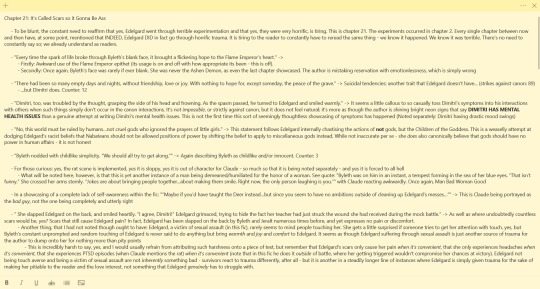
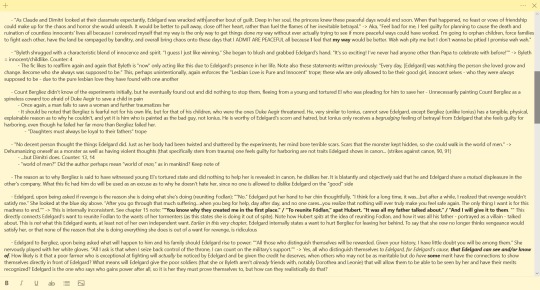
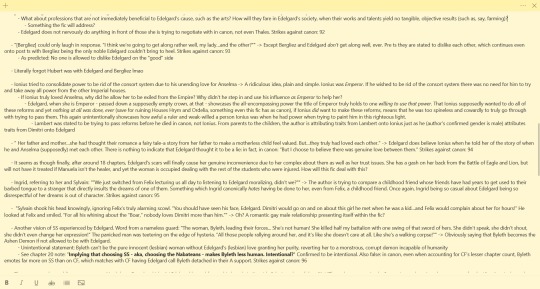

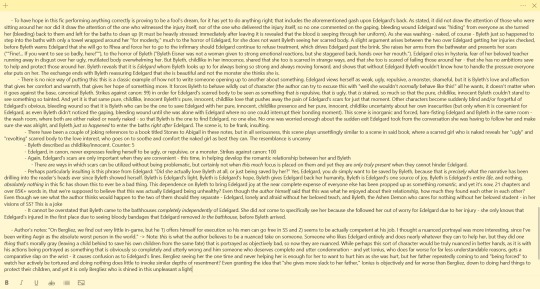

Transcript under the cut:
Chapter 21: It's Called Scars so it Gonna Be Ass
- To be blunt, the constant need to reaffirm that yes, Edelgard went through terrible experimentation and that yes, they were very horrific, is tiring. This is chapter 21. The experiments occurred in chapter 2. Every single chapter between now and then have, at some point, mentioned that INDEED, Edelgard DID in fact go through horrific trauma. It is tiring to the reader to constantly have to reread the same thing - we know it happened. We know it was terrible. There's no need to constantly say so; we already understand as readers.
- "Every time the spark of life broke through Byleth’s blank face, it brought a flickering hope to the Flame Emperor’s heart." ->
- Firstly: Awkward use of the Flame Emperor epithet (its usage is on and off with how appropriate its been - this is off).
- Secondly: Once again, Byleth's face was rarely if ever blank. She was never the Ashen Demon, as even the last chapter showcased. The author is mistaking reservation with emotionlessness, which is simply wrong
- "There had been so many empty days and nights, without friendship, love or joy. With nothing to hope for, except someday, the peace of the grave." -> Suicidal tendencies: another trait that Edelgard doesn't have... (strikes against canon: 89)
- ...but Dimitri does. Counter: 12
- "Dimitri, too, was troubled by the thought, grasping the side of his head and frowning. As the spasm passed, he turned to Edelgard and smiled warmly." -> It seems a little callous to so casually toss Dimitri's symptoms into his interactions with others when such things simply don't occur in the canon interactions. It's not impossible, or strictly against canon, but it does not feel natural; it's more as though the author is shining bright neon signs that say DIMITRI HAS MENTAL HEALTH ISSUES than a genuine attempt at writing Dimitri's mental health issues. This is not the first time this sort of seemingly thoughtless showcasing of symptoms has happened (Noted separately: Dimitri having drastic mood swings)
- "No, this world must be ruled by humans…not cruel gods who ignored the prayers of little girls." -> This statement follows Edelgard internally chastising the actions of not gods, but the Children of the Goddess. This is a weaselly attempt at dodging Edelgard's racist beliefs that Nabateans should not be allowed positions of power by shifting the belief to apply to miscellaneous gods instead. While not inaccurate per se - she does also canonically believe that gods should have no power in human affairs - it is not honest
- "Byleth nodded with childlike simplicity. “We should all try to get along.”" -> Again describing Byleth as childlike and/or innocent. Counter: 3
- For those curious: yes, the rat scene is implemented, yes it is sloppy, yes it is out of character for Claude - so much so that it is being noted separately - and yes it is forced to all hell
- What will be noted here, however, is that this is yet another instance of a man being demeaned/humiliated for the honor of a woman. See quote: "Byleth was on him in an instant, a tempest forming in the sea of her blue eyes. “That isn’t funny.” She crossed her arms sternly. “Jokes are about bringing people together...about making them smile. Right now, the only person laughing is you.”" with Claude reacting awkwardly. Once again, Man Bad Woman Good
- In a showcasing of a complete lack of self-awareness within the fic: "“Maybe if you’d have taught the Deer instead…but since you seem to have no ambitions outside of cleaning up Edelgard’s messes…”" -> This is Claude being portrayed as the bad guy, not the one being completely and utterly right
- " She slapped Edelgard on the back, and smiled heartily. “I agree, Dimitri!” Edelgard grimaced, trying to hide the fact her teacher had just struck the wound she had received during the mock battle." -> As well as where undoubtedly countless scars would be, yes? Scars that still cause Edelgard pain? In fact, Edelgard has been slapped on the back by Byleth and Jeralt numerous times before, and yet expresses no pain or discomfort.
- Another thing, that I had not noted though ought to have: Edelgard, a victim of sexual assault (in this fic), rarely seems to mind people touching her. She gets a little surprised if someone tries to get her attention with touch, yes, but Byleth's constant unprompted and random touching of Edelgard is never said to do anything but bring warmth and joy and comfort to Edelgard. It seems as though Edelgard suffering through sexual assault is just another source of trauma for the author to dump onto her for nothing more than pity points
- This is incredibly harsh to say, yes, and I would usually refrain from attributing such harshness onto a piece of text, but remember that Edelgard's scars only cause her pain when it's convenient, that she only experiences headaches when it's convenient, that she experiences PTSD episodes (when Claude mentions the rat) when it's convenient (note that in this fic he does it outside of battle, where her getting triggered wouldn't compromise her chances at victory). Edelgard not being touch averse and being a victim of sexual assault are not inherently something bad - survivors react to trauma differently, after all - but it is another in a steadily longer line of instances where Edelgard is simply given trauma for the sake of making her pitiable to the reader and the love interest, not something that Edelgard genuinely has to struggle with.
- "As Claude and Dimitri looked at their classmate expectantly, Edelgard was wracked with another bout of guilt. Deep in her soul, the princess knew these peaceful days would end soon. When that happened, no feast or vows of friendship could make up for the chaos and horror she would unleash. It would be better to pull away, close off her heart, rather than fuel the flames of her inevitable betrayal." -> Aka, "Feel bad for me, I feel guilty for planning to cause the death and ruination of countless innocents' lives all because I convinced myself that my way is the only way to get things done my way without ever actually trying to see if more peaceful ways could have worked. I'm going to orphan children, force families to fight each other, have the land be rampaged by banditry, and overall bring chaos onto these days that I ADMIT ARE PEACEFUL all because I feel that my way would be better. Wah wah pity me but I don't wanna be pitied I promise wah wah."
- "Byleth shrugged with a characteristic blend of innocence and spirit. “I guess I just like winning.” She began to blush and grabbed Edelgard’s hand. "It's so exciting! I’ve never had anyone other than Papa to celebrate with before!”" -> Byleth = innocent/childlike. Counter: 4
- The fic likes to reaffirm again and again that Byleth is "now" only acting like this due to Edelgard's presence in her life. Note also these statements written previously: "Every day, [Edelgard] was watching the person she loved grow and change. Become who she always was supposed to be." This, perhaps unintentionally, again enforces the "Lesbian Love is Pure and Innocent" trope; these wlw are only allowed to be their good girl, innocent selves - who they were always supposed to be - due to the pure lesbian love they have found with one another
- Count Bergliez didn't know of the experiments initially, but he eventually found out and did nothing to stop them, fleeing from a young and tortured El who was pleading for him to save her - Unnecessarily painting Count Bergliez as a spineless coward too afraid of Duke Aegir to save a child in pain
- Once again, a man fails to save a woman and further traumatizes her
- It should be noted that Bergliez is fearful not for his own life, but for that of his children, who were the ones Duke Aegir threatened. He, very similar to Ionius, cannot save Edelgard, except Bergliez (unlike Ionius) has a tangible, physical, explainable reason as to why he couldn't, and yet it is him who is painted as the bad guy, not Ionius. He is worthy of Edelgard's scorn and hatred, but Ionius only receives a begrudging feeling of betrayal from Edelgard that she feels guilty for harboring, even though he failed her far more than Bergliez failed her.
- "Daughters must always be loyal to their fathers" trope
- "No decent person thought the things Edelgard did. Just as her body had been twisted and shattered by the experiments, her mind bore terrible scars. Scars that the monster kept hidden, so she could walk in the world of men." -> Dehumanizing oneself as a monster as well as having violent thoughts (that specifically stem from trauma) one feels guilty for harboring are not traits Edelgard shows in canon... (strikes against canon, 90, 91)
- ...but Dimitri does. Counter: 13, 14
- "world of men?" Did the author perhaps mean "world of man," as in mankind? Keep note of
- The reason as to why Bergliez is said to have witnessed young El's tortured state and did nothing to help her is revealed: in canon, he dislikes her. It is blatantly and objectively said that he and Edelgard share a mutual displeasure in the other's company. What this fic had him do will be used as an excuse as to why he doesn't hate her, since no one is allowed to dislike Edelgard on the "good" side
- Edelgard, upon being asked if revenge is the reason she is doing what she's doing (reuniting Fodlan): "“No.” Edelgard put her hand to her chin thoughtfully. “I think for a long time, it was…but after a while, I realized that revenge wouldn’t satisfy me.” She looked at the blue sky above. “After you go through that much suffering…when you beg for help, day after day, and no one cares...you realize that nothing will ever truly make you feel safe again. The only thing I want is for this madness to end.”" -> This is internally inconsistent. See chapter 15 note: ""You know why they created me in the first place.” / “To reunite Fódlan,” spat Hubert. “It was all my father talked about.” / “And I will give it to them. "" This directly connects Edelgard's want to reunite Fodlan to the wants of her tormenters (as this states she is doing it out of spite). Note how Hubert spits at the idea of reuniting Fodlan, and how it was all his father - portrayed as a villain - talked about. This is not what this Edelgard wants, at least not of her own independent want. Earlier in this very chapter, Edelgard internally states a want to hurt Bergliez for leaving her behind. To say that she now no longer thinks vengeance would satisfy her, or that none of the reason that she is doing everything she does is out of a want for revenge, is ridiculous
- Edelgard to Bergliez, upon being asked what will happen to him and his family should Edelgard rise to power: "“All those who distinguish themselves will be rewarded. Given your history, I have little doubt you will be among them.” She nervously played with her white gloves. “All I ask is that when I seize back control of the throne, I can count on the military’s support.”" -> Yes, all who distinguish themselves to Edelgard, for Edelgard's cause, that Edelgard can see and/or know of. How likely is it that a poor farmer who is exceptional at fighting will actually be noticed by Edelgard and be given the credit he deserves, when others who may not be as meritable but do have some merit have the connections to show themselves directly in front of Edelgard? What means will Edelgard give the poor soldiers (that she or Byleth aren't already friends with, notably Dorothea and Leonie) that will allow them to be able to be seen by her and have their merits recognized? Edelgard is the one who says who gains power after all, so it is her they must prove themselves to, but how can they realistically do that?
- What about professions that are not immediately beneficial to Edelgard's cause, such as the arts? How will they fare in Edelgard's society, when their works and talents yield no tangible, objective results (such as, say, farming)?
- Something the fic will address?
- Edelgard does not nervously do anything in front of those she is trying to negotiate with in canon, not even Thales. Strikes against canon: 92
- "[Bergliez] could only laugh in response. “I think we’re going to get along rather well, my lady…and the other?”" -> Except Bergliez and Edelgard don't get along well, ever. Pre ts they are stated to dislike each other, which continues even onto post ts with Bergliez being the only noble Edelgard couldn't bring to heel. Strikes against canon: 93
- As predicted: No one is allowed to dislike Edelgard on the "good" side
- Literally forgot Hubert was with Edelgard and Bergliez lmao
- Ionius tried to consolidate power to be rid of the consort system due to his unending love for Anselma -> A ridiculous idea, plain and simple. Ionius was Emperor. If he wished to be rid of the consort system there was no need for him to try and take away all power from the other Imperial houses.
- If Ionius truly loved Anselma, why did he allow her to be exiled from the Empire? Why didn't he step in and use his influence as Emperor to help her?
- Edelgard, when she is Emperor - passed down a supposedly empty crown, at that - showcases the all-encompassing power the title of Emperor truly holds to one willing to use that power. That Ionius supposedly wanted to do all of these reforms and yet nothing at all was done, ever (save for ruining Houses Hrym and Ordelia, something even this fic has as canon), if Ionius did want to make these reforms, means that he was too spineless and cowardly to truly go through with trying to pass them. This again unintentionally showcases how awful a ruler and weak-willed a person Ionius was when he had power when trying to paint him in this righteous light.
- Lambert was stated to be trying to pass reforms before he died in canon, not Ionius. From parents to the children, the author is attributing traits from Lambert onto Ionius just as he (author's confirmed gender is male) attributes traits from Dimitri onto Edelgard
- " Her father and mother…she had thought their romance a fairy tale-a story from her father to make a motherless child feel valued. But…they truly had loved each other." -> Edelgard does believe Ionius when he told her of the story of when he and Anselma (supposedly) met each other. There is nothing to indicate that Edelgard thought it to be a lie: in fact, in canon: "But I choose to believe there was genuine love between them." Strikes against canon: 94
- It seems as though finally, after around 18 chapters, Edelgard's scars will finally cause her genuine inconvenience due to her complex about them as well as her trust issues. She has a gash on her back from the Battle of Eagle and Lion, but will not have it treated if Manuela isn't the healer, and yet the woman is occupied dealing with the rest of the students who were injured. How will this fic deal with this?
- Ingrid, referring to her and Sylvain: ""We just switched from Felix lecturing us all day to listening to Edelgard moralizing, didn’t we?"" -> The author is trying to compare a childhood friend whose friends have had years to get used to their barbed tongue to a stranger that directly insults the dreams of one of them. Something which Ingrid canonically hates having be done to her, even from Felix, a childhood friend. Once again, Ingrid being so casual about Edelgard being so disrespectful of her dreams is out of character. Strikes against canon: 95
- "Sylvain shook his head knowingly, ignoring Felix’s truly alarming scowl. “You should have seen his face, Edelgard. Dimitri would go on and on about this girl he met when he was a kid…and Felix would complain about her for hours!” He looked at Felix and smiled. “For all his whining about the “Boar,” nobody loves Dimitri more than him.”" -> Oh? A romantic gay male relationship presenting itself within the fic?
- Another vision of SS experienced by Edelgard. Word from a nameless guard: "The woman, Byleth, leading their forces... She’s not human! She killed half my battalion with one swing of that sword of hers. She didn’t speak, she didn’t shout, she didn’t even change her expression!” The panicked man was teetering on the edge of hysteria. “All those people rallying around her, and it’s like she doesn’t care at all. Like she's a walking corpse!"" -> Obviously saying that Byleth becomes the Ashen Demon if not allowed to be with Edelgard.
- Unintentional statement: Byleth can't be the pure innocent (lesbian) woman without Edelgard's (lesbian) love granting her purity, reverting her to a monstrous, corrupt demon incapable of humanity
- See chapter 20 note: "Implying that choosing SS - aka, choosing the Nabateans - makes Byleth less human. Intentional?" Confirmed to be intentional. Also false: in canon, even when accounting for CF's lesser chapter count, Byleth emotes far more on SS than on CF, which matches with CF having Edelgard call Byleth detached in their A support. Strikes against canon: 96
- The same nameless soldier, same context: "And those Faerghus kids…” / Edelgard leaned forward in her chair. “Ingrid…Sylvain…what of them?” / “They…they were animals. Screaming and ranting about revenge for the King.” -> Is the author really demonizing Sylvain and Ingrid for (potentially!) being mad at Edelgard for murdering one of their childhood friends? Is that really the depths the Edelgard worship will sink to, that friends becoming enraged at a friend's unjust murder from a warlord is being portrayed as something sad for the warlord? Just what else should Edelgard be pitied for?
- "The scared girl desperately tried to drown out the thoughts that reverberated incessantly. / They’re going to despise us…it’s destiny. And how could they not? If we were truly good, the Goddess would have saved us…protected us. But She didn’t. The Goddess took Mother. She took our family. And soon, She’ll take everything else we love. She hates us. / It’s what we deserve." - Now confirmed that Edelgard hears multiple voices in her head tormenting her. That trait that, once again, Edelgard does not have... (Strikes against canon: 97)
- ...but Dimitri does. This is the third time this chapter that this has happened, and far from the only chapter to display such baffling characterization of Edelgard via Dimitri's traits. It is nonsensical.
- " Why had [Edelgard] even been born at all? Nonexistence would have been preferable to watching every faint dream be dashed, to suffering alone over and over. She was just…so tired of being alive." -> Once. Again. Suicidal tendencies/thoughts is not a trait Edelgard shows in canon... (Strikes against canon: 98)
- ...but Dimitri does. The fourth! The fourth time in one chapter the author desperately wanted to just write Dimitri!
- If the fic wanted to take Edelgard in a different direction than canon does and has her display some of these traits, it would be more passable, but this fic is under the delusion that it is in any way following canon closely, especially in regards to Edelgard, and so this can only be seen as a desperate attempt from the author to have Edelgard be sympathetic by donning the skin of an actually sympathetic character such as Dimitri
- "Edelgard looked at herself in the mirror. The back of her academy uniform was stained red, the rhythmic, soft dripping of blood assaulting the princess’ ears." -> And no one commented on this? No one was worried? Not Ingrid, Sylvain, and Felix, who were sitting right by her? Not Lysithea, who saw her take the blow to her back and never get it healed? Not Dimitri, who delivered the blow? It just so happened that literally no one at all noticed this?
- Byleth literally slapped Edelgard on the back earlier? Wouldn't her hand come back red with blood if it were seeping through the uniform?
** The scene that follows the previous note is too long to quote, despite how truly terrible it is. Long quotes, even extremely long quotes, have been presented in these notes before, but the length this quotation would be if the full extent of it were written here would be a mess, and quite frankly, at that point it would do one better to simply go to the fanfiction itself and read the text from there. With the context received from these notes, if one wishes to see the words for themselves, go to chapter 21 of The Emperor and the Goddess, enter Ctrl + F (or Find in Page on mobile devices), and enter the phrase "Byleth crossed her arms, clearly frustrated" verbatim. The following note will not be quoting the entire scene from the fic (merely summarizing it), though context is needed to understand how truly bad the scene is. **
- To have hope in this fic performing anything correctly is proving to be a fool's dream, for it has yet to do anything right; that includes the aforementioned gash upon Edelgard's back. As stated, it did not draw the attention of those who were sitting around her nor did it draw the attention of the one who witnessed the injury itself, nor of the one who delivered the injury itself, so no one commented on the gaping, bleeding wound Edelgard was "hiding" from everyone as she turned her (bleeding) back to them and left for the baths to clean up (it must be heavily stressed: immediately after leaving it is revealed that the blood is seeping through her uniform). As she was washing - naked, of course - Byleth just so happened to step into the baths with only a towel wrapped around her "for modesty," much to the horror of Edelgard, for she does not want Byleth seeing her scarred body. A slight argument arises between the two over Edelgard getting her injuries checked, before Byleth warns Edelgard that she will go to Rhea and force her to go to the infirmary should Edelgard continue to refuse treatment, which drives Edelgard past the brink. She raises her arms from the bathwater and presents her scars (""Fine!... If you want to see so badly, here!""), to the horror of Byleth ("Byleth Eisner was not a woman given to strong emotional reactions, but she staggered back, hands over her mouth."). Edelgard cries in hysteria, fear of her beloved teacher running away in disgust over her ugly, mutilated body overwhelming her. But Byleth, childlike in her innocence, shared that she too is scarred in strange ways, and that she too is scared of failing those around her - that she has no ambitions save to help and protect those around her. Byleth reveals that it is Edelgard whom Byleth looks up to for always being so strong and always moving forward, and shows that without Edelgard Byleth wouldn't know how to handle the pressure everyone else puts on her. The exchange ends with Byleth reassuring Edelgard that she is beautiful and not the monster she thinks she is.
- There is no nice way of putting this: this is a classic example of how not to write someone opening up to another about something. Edelgard views herself as weak, ugly, repulsive, a monster, shameful, but it is Byleth's love and affection that gives her comfort and warmth, that gives her hope of something more. It forces Byleth to behave wildly out of character (the author can try to excuse this with "well she wouldn't normally behave like this!" all he wants, it doesn't matter when it goes against the base, canonical Byleth. Strikes against canon: 99) in order for Edelgard's scarred body to be seen as something that is repulsive, that is ugly, that is stained, so much so that the pure, childlike, innocent Byleth couldn't stand to see something so tainted. And yet it is that same pure, childlike, innocent Byleth's pure, innocent, childlike love that pushes away the pain of Edelgard's scars for just that moment. Other characters become suddenly blind and/or forgetful of Edelgard's obvious, bleeding wound so that it is Byleth who can be the one to save Edelgard with her pure, innocent, childlike presence and her pure, innocent, childlike uncertainty about her own insecurities (but only when it is convenient for Edelgard, as even Byleth didn't noticed the gaping, bleeding wound until she was alone with Edelgard where no one could interrupt their bonding moment). This scene is inorganic and forced, ham-fisting Edelgard and Byleth in the same room - the wash room, where both are either naked or nearly naked - so that Byleth is the one to find Edelgard, no one else. No one was worried enough about the sudden exit Edelgard took from the conversation she was having to follow her and make sure she was alright, and Byleth just so happened to enter the baths right after Edelgard. The scene is, to be frank, insulting.
- There have been a couple of joking references to a book titled Stones to Abigail in these notes, but in all seriousness, this scene plays unsettlingly similar to a scene in said book, where a scarred girl who is naked reveals her "ugly" and "revolting" scarred body to the love interest, who goes on to soothe and comfort the naked girl as best they can. The resemblance is uncanny
- Byleth described as childlike/innocent. Counter: 5
- Edelgard, in canon, never expresses feeling herself to be ugly, or repulsive, or a monster. Strikes against canon: 100
- Again, Edelgard's scars are only important when they are convenient - this time, in helping develop the romantic relationship between her and Byleth
- There are ways in which scars can be utilized without being problematic, but certainly not when this much focus is placed on them and yet they are only truly present when they cannot hinder Edelgard.
- Perhaps particularly insulting is this phrase from Edelgard: "Did she actually love Byleth at all, or just being saved by her?" Yes, Edelgard, you do simply want to be saved by Byleth, because that is precisely what the narrative has been drilling into the reader's heads ever since Byleth showed herself. Byleth is Edelgard's light, Byleth is Edelgard's hope, Byleth gives Edelgard back her humanity, Byleth is Edelgard's one source of joy, Byleth is Edelgard's entire life, and nothing, absolutely nothing in this fic has shown this to ever be a bad thing. This dependence on Byleth to bring Edelgard joy at the near complete expense of everyone else has been propped up as something romantic, and yet it's now, 21 chapters and over 85K+ words in, that we're supposed to believe that this was actually Edelgard being unhealthy? Even though the author himself said that this was what he enjoyed about their relationship, how much they found each other in each other? Even though we see what the author thinks would happen to the two of them should they separate - Edelgard, lonely and afraid without her beloved teach, and Byleth, the Ashen Demon who cares for nothing without her beloved student - in her visions of SS? This is a joke
- It cannot be overstated that Byleth came to the bathhouses completely independently of Edelgard. She did not come to specifically see her because she followed her out of worry for Edelgard due to her injury - she only knows that Edelgard's injured in the first place due to seeing bloody bandages that Edelgard removed in the bathhouse, before Byleth arrived.
- Author's notes: "On Bergliez, we find out very little in-game, but he 1) offers himself for execution so his men can go free in SS and 2) seems to be actually competent at his job. I thought a nuanced portrayal was more interesting, since I've been writing Aegir as the absolute worst person in the world." -> Note: this is what the author believes to be a nuanced take on someone. Someone who likes Edelgard entirely and does nearly whatever they can to help her, but they did one thing that's morally gray (leaving a child behind to save his own children from the same fate) that is portrayed as objectively bad, so now they are nuanced. While perhaps this sort of character would be truly nuanced in better hands, as it is with his actions being portrayed as something that is obviously so completely and utterly wrong and him someone who deserves complete and utter condemnation - and yet Ionius, who does far worse for far less understandable reasons, gets a comparative slap on the wrist - it causes confusion as to Edelgard's lines. Bergliez seeing her the one time and never helping her is enough for her to want to hurt him as she was hurt, but her father repeatedly coming to and "being forced" to watch her actively be tortured and doing nothing does little to invoke similar depths of resentment? Even granting the idea that "she gives more slack to her father," Ionius is objectively and far worse than Bergliez, down to doing hard things to protect their children, and yet it is only Bergliez who is shined in this unpleasant a light
- To be clear, Bergliez's decision was not a good one, but understandable. It is a gray decision to make. But notice how he is called "gray" and "nuanced" and yet Ionius is nearly completely innocent, as described by the author himself, despite their being no given explaination as to why "he was a figurehead" should be a good enough reason to wash him literally standing there and watching as his children - some of whom aren't even teens yet - get slowly tortured and killed.
- "There are many localization changes I understand (Byleth wanting to get drunk after the battle is one of them), but Treehouse's decision to remove Ionius' entire reason for power centralization (eliminating the consorts) was a big, big mistake." -> Given the history of this author's grasp on the Japanese language, this needs to be checked, as he cannot be trusted as a source as to whether this is true
******* Notes of Claude mischaracterization: Chapter 21, section 1, paragraphs 1, 21 & 23, 27 *******
#o captain my captain#is the Cap'n's name fuckin' Greg holy shit#this chapter was baaaaad#b-but hey maybe i'm just being overly critical?
66 notes
·
View notes
Text
how deep does student endangerment go in Hope’s Peak Academy?
Disclaimer: this is mostly speculation/theorizing but I’m too lazy to keep clarifying that in the middle of my discussion so take my statements as ringing true to my SPECULATIONS, not to canon. I’ll try to specify when something is directly stated in canon and link to events in the wiki.
Also warning for spoilers and everything fucked up that comes with Danganronpa (elaboration under cut)
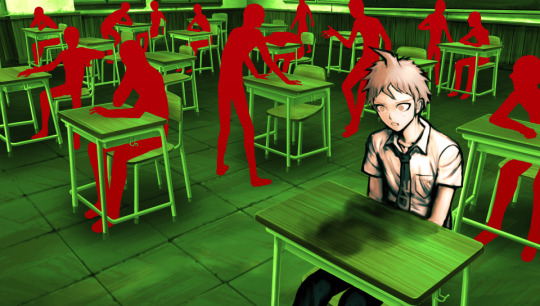
triggers: murder, suicide, brainwashing, human experimentation, terrorism, cults, manipulation, academic institutions mentally abusing/preying upon/exploiting/neglecting students, extreme idolization
more medical stuff is in some of the links btw specifically in reference to Izuru Kamukura and Yasuke Matsuda including beside murder so don’t click those if you’re wigged out by that and haven’t already been scared off
So basically, HPA is Fucked
Okay so HPA is shit at keeping their students safe, obviously. Not only did they knowingly admit multiple murderers (Mukuro Ikusaba, Syo Fukawa, Peko Pekoyama [implied], possibly Fuyuhiko Kuzuryu) AND those who likely employ murderers (Fuyuhiko and Natsumi Kuzuryu) but they also let students become murderers under their care (Izuru Kamukura [self defense], Nagito Komaeda[? see: explosion], Student Council, Sato, Yasuke Matsuda, possibly Fuyuhiko Kuzuryu [unclear if Sato was his first murder], The Madarai Brothers [attempted]). 
But I mean they also participated in illegal human experimentation so like WE BEEN KNEW. Nah I’m not here to talk about their obvious neglect, I want to talk about the societal impact HPA has had and the student culture that likely made it possible for The Tragedy to occur.
Ok so we say ~The Tragedy~ as if it was one event but that’s kinda vague to to be clear I’m talking about the external chaos that happened after Shit Went Down at HPA. The events leading up to it being The Tragedy of Hope’s Peak Academy (which I’ll call The Student Council Killing Game for clarity), The Parade, and The Reserve Course Mass Suicide.
Also Danganronpa has a tendency to greatly exaggerate mental illness because psychological instability is what makes the entire storyline tick. But I feel like many people GREATLY overlooks how that is also applied to the Reserve Course and Hajime Hinata, who is usually regarded as one of the most sane of his class.
Hajime Hinata’s mental health Concerns me
First, let’s look at the Izuru Kamukura Project/Hope Cultivation Plan. So, first things first, they actually got someone to agree to an ungodly amount of human experimentation. It’s also heavily implied (if not outright stated, my memory isn’t that good) that if Hinata rejected the offer, another Reserve student would take his place.
Now teens are dumb. And the Steering Committee did not advertise the full extent of the project. But any sensible high schooler would cringe at the idea of body, let alone mind, altering surgery. That begs the question of just how desperate are these Reserve students if this sounds like a viable option to them? Surely not all of them would jump at the chance, but the fact that even one accepted and the Steering Committee was confident they could replace Hinata if he didn’t is pretty disturbing and goes to show how valuable talent is to the students.
It’s somewhat comparable to Quirks in My Hero Academia, except MHA actually goes into the kind of Fucked Up Izuku Midoriya and namely hero society is for him to accept All Might’s Quirk. If you’re not familiar with MHA, it goes deeper into how Fucked their Hero/Quirk centric society is in the manga and exposes the results of such idolization and value attributed to their equivalent of Ultimate Talent.
But anyway back to Danganronpa. The fact that they could get someone to be their lab experiment, not looking good for the mental health of the students. Agreeing to the Kamukura project was essentially an act of suicide, and while that may not have been apparent to Hinata it should have at least occurred to him in some capacity that such major surgeries could drastically alter his mental state and even kill him. If it did occur to him, it means he thought the risk was worth taking. And if it didn’t? It likely means he was just that desperate.
And alright alright that’s Hinata’s decision. What about everyone else? Most students are just there for Hope Peak’s name, right? Where’s the indication that they’re all severely mentally ill?
The entire Reserve Course sounds kinda despair inducing
Well, first off, private school environments are Not Great mental health wise. The Reserve Department is advertised as a feeder for the Main Course, as in providing possible students to it (in reality the only feeding it actually does it monetary); so it’s probably safe to compare it to the environment of an actual feeder school, in this case an unnamed Harvard feeder school I will be referencing out of personal experience.
Academic competition is a hallmark of these schools. Along with extreme workloads. Basically you never stop moving, especially if you have certain skills you are trying to develop (in the Reserve Courses case that would be those still trying to become Ultimates). The “do or die” attitude is highly encouraged, constantly working students past their limits to burnout.
Now imagine all that fun jazz, while also knowing you actually wont get into the Main Course, unless you’ve deluded yourself like Natsumi Kuzuryu. But is that enough?? Enough for what you’re probably asking so let me explain where I’m going with this.
Why am I so concerned with them again?
Monokuma’s Gloomy Sunday is the video sent to the Reserve Course to trigger the mass suicide. We see from Danganronpa 3 when used on Makoto Naegi that it likely compelled watchers to commit suicide by preying upon any pre-existing sources of despair in their life. This is the only case we’ve seen the actual mental effects of it so I’m just assuming that’s how it works. The reason I’ve been rattling off about the mental health of Reserve Course students is because I feel there’s the implication that there already had to be a seed of despair within the students to make the mass suicide work.
And yes it technically could have been the Student Council KG that was enough to do it, but it feels absurd that out of at least 2,360 students, it worked on 2,357 of them, the three excluded being Izuru Kamukura who was working with Junko Enoshima, and Sato and Natsumi who died previously. It would surely be shocking, but doubtable that all those students had a personal enough connection with the Student Council, all of which appear to be Ultimates.
Yes I would be pissed to find out my money was allegedly being used to create a murder weapon but it would be more Parade inducing despair, not get preyed upon by my school’s freaky underground despair cult where we watch a snuff film on loop in the basement (yes this is something actually mentioned in The Parade article).
So again, this leads us back to Ultimates and their roles in society. If their despair, is enough to cause despair in complete strangers (as seen by the effects of Killing School Life) you have to wonder what the fuck kind of pedestal Talent is being put on by Hope’s Peak Academy and possible schools of the same nature.
Conclusion
Sorry there’s no conclusion. This is really just an info dump meant to get other people speculating about further world building so I’m not the only one thinking about it. Maybe it will help you when writing the Reserve Course and Hajime Hinata, who knows. I just like to sit and think about these aspects of characterization.
Kinda fucked up, huh?
#danganronpa#theories#theorizing#speculation#sdr2#reserve course#izuru kamukura#kamukura project#hope cultivation project#danganronpa 3#danganronpa 3 anime#despair arc#future arc#hope's peak academy#infodump#ramblings#den's chatter#dr crockpot
76 notes
·
View notes
Text
I apparently struck a nerve with someone and they blocked me. Just a tip dude, if you don’t like people arguing with you maybe you shouldn’t post on social media designed for reblogging, responses and rebuttles. You can still find websites that offer blogs with no comments.
But as I typed this all up i felt it worth sharing.
Pointing out similarities in ideas and actions between two group doesn’t mean I think one is equivalent to another. It means in some ways they are coming from the same place(doesn’t mean they’re going to end up in the same place) But I see you’re very good at putting words in other people’s mouths.
However you may think there’s a difference between a religious group attempting to ban a book over religious ideals, and people trying to force Ao3 to moderate to their standards, but I am going to ask what the difference is?
Also who is going to get to decide what counts as harmful/racist? I mean I get the feeling you’re something of a new-comer to this whole anti-shipping trend and aren’t aware of some of the context in history behind it.
Like the insanity of the Sherlock fandom where a contingent of people who really really preferred John topping Sherlock in their porn decided to accuse anyone writing Sherlock topping John as being pedophiles. (Surely you can understand the insanity behind that. porn written of two middle age men being pedophilia because the wrong man tops) To the point of accusing a surivor of being an abuser, as well as filming her having a breakdown(that they caused) and posting it online. https://fanlore.org/wiki/221B_Con (the 2015 con)
https://thegreenirene.tumblr.com/post/116696525144/what-happened-at-221b-con-2015-the-gender
There’s also the story that went around of a real life highschooler that was convince he had to break up with his significant other of several years because he had turned 18, but his partner hadn’t yet because him simply dating(not necessarily having sex with them) someone under 18 was pedophilia. (okay yikes)
And what about when you have people who claim that individual ships are inherently racist if you prefer them over a different ship. One example is from the Star Wars sequel trilogy where people tried to claim the Finnrose ship was inherently anti-black and racist and so people should ship Finnrey.
https://my-reylo.home.blog/tag/anti-finnrose-bs/ (rundown, with links and receipts although sadly some of the links no longer work)
So again who will get to decide? And before you say, the minors, survivors, and minorities who don’t feel safe you should try to understand that’s not a winning trump card. Because there are ALSO minors, minorities, and survivors(like me) who keep saying that they don’t feel safe in places where censorship takes place. That they find exploring the exact same topics that antis decry as harmful, helpful and therapeutic. That they don’t feel safe in places where they risk harassment, doxing, suicide baiting simply because of the fiction they like, or create.
I mean there’s an disabled artist who lost her job because of anti harassment.
https://docs.google.com/document/d/1XdfUJyVYhmaahTfbxLNU0W0yVz80hmptNrCQv7KSL6o/mobilebasic
An individual is not harmed merely by some piece of fiction existing out in the void. If they stumble on it without warning it can be upsetting, trigger pain, but that means them stumbling on it. Ao3′s tagging system does an excellent job at allowing people to not see what they don’t want to. There are a few tweaks and adjustment I wouldn’t mind seeing like a permanent exclude tags so I don’t have to constantly filter out specific tags.
I doubt that there is anything you can find on Ao3 that you would not also find examples of in any large public library
Take a brief look at New York’s Public Library eroticia for example
https://nypl.overdrive.com/search?subject=21
In the comics and graphic books section i found Sadistic Boy by tori maia, which contains examples of underage sex, adult/minor sex, rape, and incest(uncle/nephew iirc). As well as Bad teacher’s Equation which features a romantic relationship between a 16 year old highschool student and a 26 year old nurse who works at the school. Again this is the New York Public library, and I haven’t started looking at more of the books(although without Ao3′s tagging system it’s a bit harder to guess the contents with just the cover)
Is there any real reason you can think of why Ao3 should be held to higher content standards than the New York Public Library? I mean they’re both based in New York State, and go by New York State’s obscenities laws.
And I’m sorry for not including sources in my earlier posts, but I was on mobile and didn’t have all of my links.
But here’s a study discussing the sex on TV doesn’t influence teens as much as people previously thought
https://theconversation.com/sex-on-tv-less-impact-on-teens-than-you-might-think-61957
Also the relationship between fiction and reality, and the ability of various media to change and shape social norms is incredibly complex. Research attempts to discover how media can influence change, but that there’s both individual effects, social effects, and the effect can be different depending on if a person knows other people in their community have seen/heard the piece of media or not.
https://www.cambridge.org/core/journals/political-science-research-and-methods/article/how-does-media-influence-social-norms-experimental-evidence-on-the-role-of-common-knowledge/23D65E06CAB2876B08F12E23CD5C0539
So keeping that in mind that fanfiction is still very much a niche hobby/activity and you’re unlikely going to find an entire community(of people who happen to be living in the same area definition) reading the same fic, Fanfiction’s ability to impact reality is pretty much non-existent compared to the latest offering from Disney, Warner Brother’s or Netflix.
I can have empathy for people who are uncomfortable or feel they are hurt when they see certain topics in fiction. However I wish they would try to have a little empathy for the people who find comfort and healing within that same topic. The solution is not censorship or people stop creating taboo fiction. The solution is right there in Ao3′s tagging, people who don’t want to see certain content can avoid it, people who do want to see certain content can find it. I’m sorry but I cam going to have a hard time finding sympathy for people who demand that everyone else cater to them and their feelings without a thought for anyone else's.
16 notes
·
View notes
Text
(Me: when will you stop?
Also Me: till the earth explodes :3)
Name:
Veronica Flare
Name pronunciation:
Ver-on-i-ca Fla-re
Nickname:
The executioner
Personality:
Flamboyant, vengeful, extravagant, sadistic, loyal, looney, charming, jokester
Age:
523 years old
Species:
Venus flytrap
Sexuality:
Pansexual
Gender:
Transwoman
Pronouns:
She/her
Ethnicity:
???
Looks:
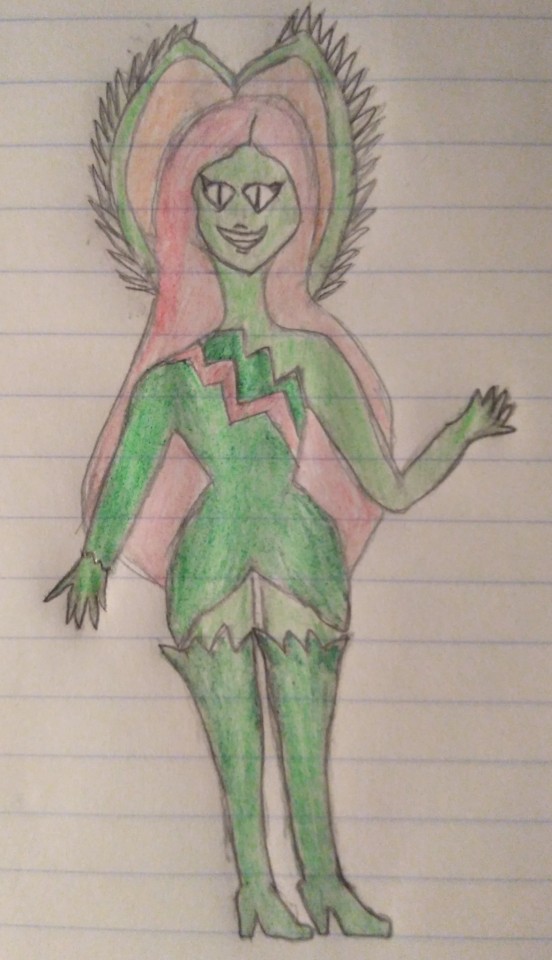
Backstory:
(WARNING: mentions of torture, suicide, & transphobia)
During the era of which Hatred was ruling over Amoretia, she had many enemies who would happily want her buried alive. So in response, Hatred decided to strike fear into them. She thought they'd be much easier to control and leave her alone if they were afraid of her. Yet, how could she accomplish it? Torture. But an amount of torture that would keep them alive and make others fear her. If her enemies saw the state of her victims, they would see what she was capable of. At first, Hatred would handle most of the torturing but couldn't for long. Her armies and supporters needed her leadership. So, Hatred hired multiple tortures to do the job for her. The job was simple, torture the enemy but too much to a point where they die. One problem though. Some of the things Hatred would instruct them to do, was a bit too much for them... Such as It affected their mental and emotional health. Hatred didn't care though, she still wanted them to do it. If they didn't, they would be met with her wrath. And one of the things no one should ever do.. is anger the queen.
The tortures slowly fell in numbers. Some of them going insane from what they committed. While others committed suicide. A few of them tried to start a revolt against the queen with the prisoners they were supposed to be torturing. In response, Hatred had them tied to a ship and slowly had it sink. Hatred hired more torturers but it would always seem to be a repeat of what happened last time. Going insane, suicide, and revolting against her. Seeing as no matter what she did, the issue wouldn't go away. After pondering with herself for a while, she came up with a perfect idea.
She'll create her own torturer.
Hatred went through many spells books in order to find a way to create such a being. Not being satisfied with any of the options she had, she went onto experiment. While she wasn't away fighting alongside her armies or making plans with her cabinet, she'd frequently experiment on how to create life. Her first few experimentations didn't go as planned. Most of them coming up as failures in her eyes. Hatred would get severely frustrated with not getting the results she wanted. Often destroying her own room in the process. Hatred tried for months to create the perfect specimen. They had to be equally terrifying, threatening, and cruel. As well as some certain traits that would make them not become insane or betray her. She made a specially designed potion containing such traits. Making the being morally corrupt, sadistic, and loyal to her and only her.
A year later, she finally got the result she wanted... Well, sort of. By using a venus flytrap along with a potion and black magic, she created a being from it. A being she would call Victor Flare. Of course Victor wasn't exactly what she wanted. To her he was way too skinny, not as tall, and not terrifying looking at all. Yet, he had some form of intelligence and had all four of his limbs along with working organs. By this point she was growing tired of experimenting and decided to go with him. He was born twenty three years old yet had the mind of a newborn. Right after he was created, Victor was immediately put to learning about Hatred's ideology. It confused him a lot at first. Mainly because he had no clue how to read or write. After realizing that the creature she created couldn't just learn about her ideology, she allowed him to be taught subjects like math, science, and language arts. Victor eventually learned how to read and write as well as speak. After becoming intelligent, Hatred thought that he was finally ready. She began to teach him how to torture her enemies. Most of the time the torture lessons would be hands-on. Victor found himself enjoying giving pain to people. Most likely due to Hatred making him have the certain traits that she desired. She was pleased with the outcome of seeing him torture and made him her royal torturer. Finally getting what she wanted, Hatred could finally focus on spreading her ideology as well as defeating some of her enemies. She'd usually bring back some soldiers on the enemies side or even her main enemy for Victor to torture. He'd always do as she requested in order to make her happy. Hatred never physically showed her happiness but did seem to be pleased with what he did. Although he could do better. Hatred eventually casted a spell that gave him powers that would allow him to do more awful things. The powers were tied to his species which allowed him to control and manipulate plant life. Victor became fascinated with his powers. His first thought was how there were so many ways to make a person suffer. He would then use his powers, primarily manipulating vines in order to tear them apart, limb by limb, slowly and painfully.
As much as he enjoyed making Hatred's enemies suffer, he started having other thoughts. He began to question his own actions. Why was he torturing these people? Sure he liked it but why them? He knew they were the enemy but why were they the enemy? When asking Hatred these questions, she only reiterated that they didn't follow the right way of how to truly live. How love was an infectious disease and how it would be the Galaxy's downfall. How she was born in order to stop such a thing from happening. Even though Victor was maybe five months old at this point, knew that her ideology was incredibly flawed. Yet, he never commented anything about it. Knowing that if he did, she'd torture him as well. Victor knew that these people he was hurting were innocent... Strangely, it made it much more fun for him. Most likely due to him being specifically made morally corrupt. After answering that question, there was another question brewing in his mind.. Who was he? Well he knew who he was. He was the loyal servant to Hatred who was given the task to harm her enemies. But.. who was he really? Behind those layers of plant flesh and blood? What was the core center? This lead to him questioning his own identity.
He questioned if he was only a torturer and if that was the only thing in his life. Victor wanting more meaning in his life took up hobbies. Mainly reading books. His favorite books being that of fairytales. Victor would also often be taking care of his appearance. Nobody wants blood stained faces after torturing all day. He first wondered if he wasn't a torturer, what else could he be? Maybe a makeup artist or a hair dresser. Those jobs sounded thrilling but not as much fun as tearing someone's skin off. As much as Victor took care of his appearance, he could never shake the feeling something was off about him. He felt uncomfortable in his skin. Often covering his skin with layers of clothing. He never knew why though. He didn't know but felt like he needed to. Victor would only get his answer when he was reading another one of his books. It showed illustrations of beautiful women wearing gowns and enjoying a picnic. Victor felt what would be known as "gender dysphoria". He felt uneasy with his own gender. As if he was born in the wrong body. Well, he kinda was as Hatred would put it. Although it was more about gender for him but it was everything else from Hatred. She didn't even want him to have a gender in the first place. Victor would slowly begin to put on makeup. First it was a bit of eyeliner then lipstick and full on layer of makeup. He felt comfortable with himself as he put on the makeup. Victor felt beautiful. When Hatred was away, he'd sneak into her room and wear one of her dresses. He didn't like the colors but enjoyed wearing it regardless. Eventually, Hatred would catch him doing this. In response she yelled at him before kicking him out of her private quarters. She wasn't mad about him wearing a dress but actually about that it was HER dress. Hatred didn't like it when people touched her things. Despite that, Victor began to take on more feminine traits. He started to talk in a much more high pitched voice. He wore high heels while torturing people. They were confused but didn't question it if they wanted a harsher punishment. One day, Victor full on dressed in a beautiful long gown, heels, and makeup. He adored it very much and praised himself for looking so good. Yet, he still didn't feel comfortable with himself. Despite looking gorgeous, he didn't like his gender. He didn't feel like he was born in the right body. He was destained to be someone else. Victor came to the conclusion that he wasn't born to be a man... He was supposed to be a woman. But how exactly could he turn into one..?
Magic. That was the answer. If Hatred could create him with just a potion and a few funny magic words, then surely there was a way for him to become a woman. After looking through several spell books, he finally found the spell he was looking for. The creation of a potion that would allow one to permanently become a woman. It was hard work but Victor managed to collect all the ingredients he needed to make the potion. He then finally drank the potion. It was a success and a bit later, Victor would change his name to Veronica. Along with his pronouns to she/her. When Hatred came to learn of this, she didn't really care. All she wanted was her enemies to suffer. Veronica happily compiled as soon as Hatred called her by her correct pronouns.
Veronica finally felt comfortable with herself. Enjoying to be in her own skin and loving herself throughout. Although she was met with a problem, many people loathed her for torturing people. When her enemies found out that she was trans, they decided to harass her on that. Often yelling slurs at her and sending hurtful letters about how horrible of a MAN she was. Veronica was angered by this. Offended that they still thought of her as a man and not as a woman. She could take being called a horrible person for committing atrocious acts or even being called a literal hellspawn. Veronica found their insults to be humourous sometimes. She'd even provoke them to insult her more. But misgendering her was taking it too far... She wasn't a man anymore and was happy being her true self. Then it all came crashing down when many people began to refer to her as "Victor" her deadname. Finally reaching her breaking point, Veronica unleashed hell on Amoretia... All of her enemies would feel her wrath for treating her horribly. Many of them were mainly torn limb from limb while others had much more horrible punishments. One person was slowly impaled by a bamboo shoot. Another covered in flowers that attracted bees and slowly died from being stung to death. Yet the one person that met the worst fate was young woman by the name of Patty Marrion. Patty would often be the one harassing Veronica daily. Calling her all sorts of horrible things, saying her decisions were choices instead of actually feelings, and literally made pamphlets demonizing trans folk. After weeks of being tormented, Patty was now at the mercy of Veronica who wasn't very keen on letting her go. Veronica seem to play it simple though... All she asked Patty to do was drink a glass of wine she specially made for her. Patty knew this was one of her sick and twisted games of Veronica. She expected to be poisoned but nothing to seem to happen at first. Yet before Patty could respond, most likey taunting her about how her planned failed, she began to feel something change inside her... What Patty hadn't realized was that Veronica put inside a special seed. A special seed that slowly turned Patty into a tree... It was quite a horrifying sight as Patty realized what was happening to her. She begged for mercy. Apologizing repeatedly for her actions. Yet, it was too late... Veronica watched in glee as Patty slowly circumed to her fate. Right after the transformation was complete, Veronica took an axe, chopped down the tree, and made a lovely chair for Hatred to sit on. Veronica's tyranny wouldn't end after those events. Right after she went in a rampage and gifting Hatred the chair, Hatred promoted her by making her executioner. As well as have some form of control over Amoretia while she was away fighting wars. It was a very good deal for Veronica as now she could implement about how much she adored being herself and torture anyone she wanted!
Unfortunately after two years of this, Hatred would then be "executed" by her enemies. Veronica became extremely depressed that their "wonderful" and "fantastic" leader was put to death. Not wanting her legacy of destroying all love to die out, Veronica tried to lead Amoretia and the armies herself. Veronica never truly believed in destroying love but would do it out of respect for Hatred. Yet, the other monarchies weren't going to let that happen. They declared that Veronica had to be put to death for her crimes. She would end up going on the run for a while. Then, it seemed like she straight up disappeared. There wasn't any trace of her left. No leads, no eyewitnesses, and no sightings. Amoretia would soon be ran by a government in order to establish some sort of order. Sadly, the kingdom would never return back to it's prime time... Although some people on Amoretia do still believe Veronica is still out there... Plotting.. Seeking revenge.. and going to return one day.
Likes:
Makeup, fashion, taunting others, desserts, making jokes/puns, torturing people, violence, & practicing magic
Dislikes:
Being misgendered, her deadname, people disrespecting Hatred, insects, stepping on her shoes, transphobes, dull things, and sour foods
Powers/abilities:
Nature manipulation - connected directly to the natural world and thus can communicate, influence, manipulate and control nature
Potion making - substances with magical properties such as enhancing physical and mental abilities, healing, granting powers, changing shape, or bewitching someone depending on the kind of potion that is made.
Immortality - endless lifespan
Weaknesses:
Fire - the most feared thing a plant could ever face.
Vulnerable - can have a long lifespan but can still die
Water - isn't a very strong swimmer
Physical strength - Veronica isn't the strongest and even Baozhai could beat her in a fight
Occupation:
Torturer & Executioner
Other:
Veronica's flytrap flaps often closes whenever she goes to sleep or whenever she doesn't want to talk to anyone.
#I'm sorry if i portray my trans character inaccurately#this is my first time writing and creating a transgender character#I'm open to any criticism if you have any to give in order to improve her character and to accurately portray her being trans#Baozhai: um who are you?#Veronica: I'm you but much better looking#Baozhai: HEY >:((#oc insert#Veronica
2 notes
·
View notes
Text
I’ve survived Now I’m Invincible

To further elaborate on why Ironwood believes his own hype is to look back and see what he has accomplished. To start we are going to look at what he most likely achieved before his debut in Volume 2. Now what accomplishments did he achieve?
Won at least 1 (maybe 2?) Vytal Tournaments
Achieved the rank of General
Formed a corporate contract with the SDC
Able to obtain 2 positions of the Atlasien Council(Headmaster and Atlas equivalent of the Chief of Staff)
Survived whatever event that had cost him half his body
Furthered the Advancement and prosperity of Atlas
Greenlit experimental Aura programs that worked(Penny)
Some of these are speculative but these are potential reasons why Ironwood would believe in his own ability and assumed rightful place as a chosen one. Because he has made achievements of his own that are worthy of respect and praise from others. But this can only get him so far and doesn't really clarify his combat/ wartime experience( if he had some). Which brings me to probably the most overlooked part of rwby lore in recent times; The Faunus Rights Revolution, A.K.A. The Faunus War.

Now why would I bring up an old conflict that was used as a throw away line in Jaunedice pt 2 and to just further elaborate the history of the white fang?
Well this was more or less the most recent world crisis before the events of Volume 3. And as established in the last section Mantle was more or less a near faccist dystopia led by potential warmongering sore losers. Hellbent on reclaiming what they saw was rightfully theirs. The reason why I say it was recent was because as Blake said the white fang was founded some time after the revolution and with V4 confirming Ghira Belladonna as the first leader if not potential founder of the organization. Meaning the conflict happened during Ghira’s Generation.
And Ghira appears to be as old if not slightly younger than Ironwood meaning that the conflict most likely happened sometime after Ironwood graduated from Atlas in 29 or 26 B.F.B and resolved itself sometime prior to the majority of the main heroes being born in 17 B.F.B. That's a timespan of 9-12 years. Meaning Ironwood would have been a young officer of either Company or Field grade during this conflict being exposed to and gaining some legitimate status as a Military veterian with actual wartime experience.
Now why would Ironwood be a part of this war?
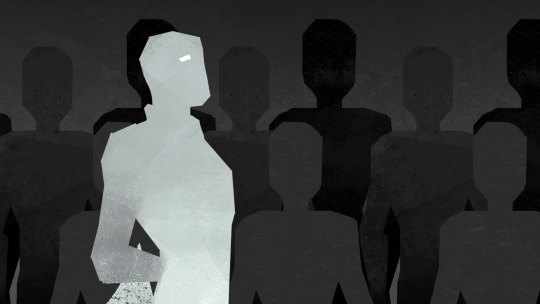
As the World of Remnant has told us (especially the Atlas Faunus and great war segments) Menagerie was among the lands under Mistrals control that were redistributed to the rest of the world specifically the Faunus but saw this as a slap to the face from Mistral who had given them this land. As well as the Atlasian trained Huntsman are pressured to join the Military and are most likely drafted for service in times of crisis. Now the beginnings of this conflict are relatively unknown other than a human faction going to war with the Faunus as a whole. Not the whole of the 4 kingdoms but a fraction of at least 2 of them.
The guaranteed culprit for the war was Mistral as Mistral at one point held the world's most diverse resourced territory and probably was not happy to relinquish it to its former faunus slaves(possibly). And as such worsened the tensions in hopes to play the victim of the conflict and would try to rebuild its territorial empire starting with Menagerie.
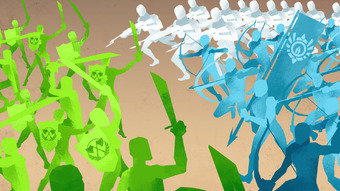
Now this is where Ironwood and Mantle/Atlas come in as honoring the old alliances that they most likely still had, came to the aid of mistral as they did in the beginning of the Great War. Only problem was that Mantle was demilitarized and all of its senior and veteran soldiers are either dead or not fit for service anymore at this point. Hence why the human factions of this conflict lost and the faunus more or less won. Because they were no longer the world's strongest military power at this point.
Now obviously Ironwood if he had participated in this conflict survived and more or less gained 3 years of war experience (and then some). However this was possibly the most disastrous and humiliating event of his early career as he was on the losing side. But he survived nonetheless and continued to survive and prosper all the way till his debut in Volume 2.
Where am I going with this? Below are several events and potential battles that Ironwood could have survived from if he was a part of them.
Several Grimm encounters
The Faunus War
White Fang Terrorists(possibly)
The Paladin Incidents(possibly)
Salem's Assassins(possibly)
Losing half his Body
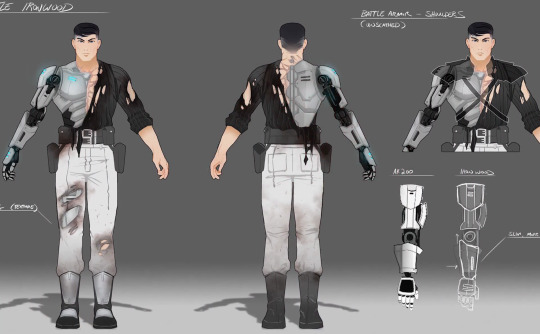
Taking these into account with some speculation Ironwood has survived his fair share of engagements if not more. As such with the added ideology of his assumed chosenness has developed a false sense of Invulnerability. And further grew his ambitions which also developed the mindset of what is known as the glory hound officer.
What type of officer is that you may ask?
Well the glory hound officer is the type of individual you can spot from a mile away. There are many types however generally they love to engage in flashy and visible frontal attacks, something of which Ironwood has shown in the show is all for it. These individuals become extremely narrow focused on obtaining glory and usually forget about the entire battlefield around them.
Similar to how Ironwood praised the Amity project as it was the spearhead for his glory of uniting remnant while at the cost of ignoring the needs and security of mantle where his enemies had exploited it to their ends because ironwood was focused on obtaining the grandeur victory that was the promise of Amity instead of focussing on the other small conflicts that were happening around him that needed his attention the most.
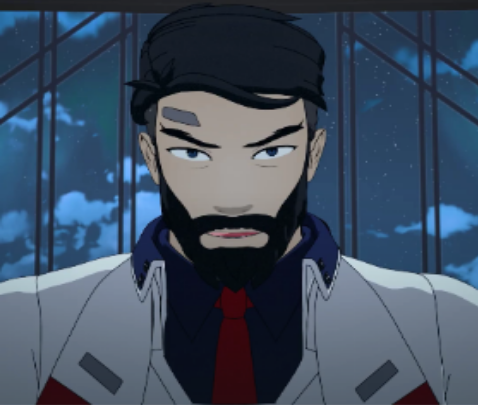
This makes them extremely deadly to be around not only are these officers usually pretty incompetent they’re also bordorline suicidal or just don’t understand the consequence of what death is so long as they get their moment to shine.
When high ranking individuals like Ironwood would volunteer for the frontlines it's usually the result of an officer who as we stated earlier has survived far too many battles and has a really weird sense of invincibility. This type of thinking can more or less infuriate the minds of the individuals under their command. Individuals like RWBY, Jaune, Nora and even the council who are shown to be done with Ironwoods actions and try to bail from it the first chance they get simply because the actions they are partaking in come from an individual who is not right in the head.
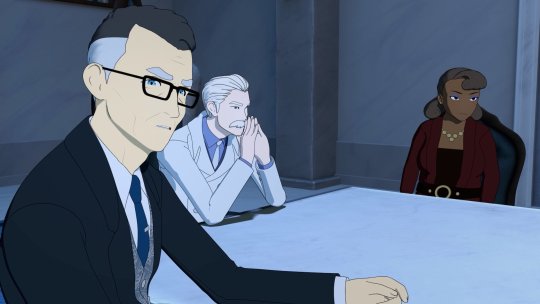
Moral of the story keep an eye on individuals like Ironwood because you may never know when and if they do or give an order that would just lead to a waste of resources and unnecessary deaths that can be avoided had the CO contained his ego and realized that those under their command have a need of self preservation and aren’t willing to die without knowing it would mean something.
Now besides the conflicts why would Ironwood keep and maintain this unhealthy mindset. The answer Home for
Home is where the heart is
#rwby#world of remnant#general ironwood#rwby ironwood#james ironwood#rwby spoilers#rwby theory#rwby analysis#rwby atlas#rwby faunus#rwby salem#rwby mantle#rwby ace ops#rwby mistral#Ironwood analysis
38 notes
·
View notes
Photo

*HIGH-TECH BEAMED TERRORISM* Typically the goal with relentless 24/7 tracking, monitoring and high-tech harassment is to push the target over the edge for entrapment with suicide considered a successful mission. The image reveals an official demonstration of DHS Malintent technology which also is an example of brainwave mind reading software to an advanced computer system. MALINTENT https://www.computerworld.com/article/2469953/homeland-security-testing-mind-reading-terrorist--pre-crime--detectors.html ASSOCIATED VIDEO https://www.youtube.com/watch?v=MRGF7YL_LNM Below is just a short list of the specific technology being used specifically for Targeting untold numbers of civilians marked for human experimentation. 1. Voice to Skull aka DOD "Voice of God" technology harassing victims around the clock beamed from state-of-the-art operation centers or compliant neighboring locations where the victim is called vicious names 24/7 backed by electrical shocks from Directed Energy Weapons and covert microwave torture. LINK: https://youarenotmybigbrother.blog/2017/01/17/mind-control-schizophrenic-high-tech-fraud-docudrama-is-now-available-at-amazon-com/ 2. Your cloned emotions beamed back you - If you are sad or depressed one day, the technology imprints your brainwave, then it is beamed back to you while you are being tortured and degraded. CLONING THE EMOTIONS PATENTS: https://patents.google.com/patent/US5356368A/en https://patents.google.com/patent/US3951134A/en EEG/HETERODYNING https://gangstalkingmindcontrolcults.com/dr-robert-duncan-the-science-of-mind-manipulation-eeg-electro-encepholagraphic-heterodyning-remote-mind-control-2014-ppt/ 3. Memory and Idea Kill - You think of a way to better your life and it is erased from your memory. The low level enforcers of this program do not want victims successful in any way or advancing. FAKE MEMORIES: http://www.activistpost.com/2015/04/mind-control-researchers-create-fake.html 4. Hologram - You wake up and a little green man, glowing in the dark, hisses at you then poof it disappears into thin air. A beam of Jesus second coming is beamed in the sky for fear and submission. PROJECT BLUE BEAM: http://www.bibliotecapleyades.net/sociopolitica/esp_sociopol_bluebeam01.htm 5. Viewing what you see using your eyes - Your eyes become their lens for everything that you see. This is so they can attempt to influence your thoughts before you even think about what you are seeing. See: Looking Through the Eyes of a Cat - Berkley University (BBC article) and link below. https://petapixel.com/2011/07/27/turning-the-eye-into-a-camera-sensor/?fbclid=IwAR0GLZNSuAZEWQgG1OhmbmD_4mlaMKG_ois9M0gE0kterZbaiWz_sWExDTk 6. Listening to what you hear and your subvocal thoughts. This is a requirement for V2K, Voice of God, also known as Synthetic and Artificial Telepathy, Neural Decoding, Remote Neural Monitoring, and the microwave Frey Effect and Neurophone. In order to communicate with the victim they must hear what the victim is thinking inside the human brain. THOUGHT TRANSMISSION PATENT https://patents.google.com/patent/DE10253433A1/en MIND READING http://www.huffingtonpost.com/news/mind-reading-technology/ 60 MINUTES https://www.youtube.com/watch?v=Qwk2pqfYQFc Read your thoughts - Key to this capability is to keep this operation one step ahead of the victim when seeking justice. They know in advance your plan for the day and sabotage it before you even can seek help by contacting the party or preparing harassment where your are going. What you are thinking around the clock is used in the ongoing search for anything useful to exploit, even a passing thought, such as any type of fear, anger, hurt, pain and also to destroy any thoughts of happiness, a love interest, etc.. 8. Forced Speech - Several news reports, used as human guinea pigs have had forced speech beamed at them while on the air to include Judge Judy. VIDEO: https://www.youtube.com/watch?v=2rWmpgWHG_0 9. People are beamed hatred for each others in order to keep chaos, fighting, and separation. Recruits in these mobilized covert harassment and torture program are also watched and beamed hate towards the victim they are hired to torture. Beamed hatred insures recruits don't realize that what is happening is wrong and denial of the truth of this heinous program. SUBLIMINAL MESSAGE GENERATOR https://patents.google.com/patent/US5270800A/en 10. Unwanted high-tech beamed sexual stimulation is to humiliate the victim in a very personal way. Also known as high tech rape! Below are patents for nervous system manipulation. https://patents.justia.com/inventor/hendricus-g-loos BEAMED TORTURE https://www.scribd.com/document/282844331/The-Executive-Summary-Neuropsychological-and-Electronic-No-Touch-Torture-Report-by-Robert-Duncan-a-B-S-M-M-B-a-Ph-D REFERENCE WEBSITE: http://bigbrotherwatchingus.com Knowledge is power and awareness is the key. The a TRUTH a very powerful weapon to save lives an all that's needed as many united to expose this ungodly program ran by ruthless, officiated human monsters who are clean-shave, suited and in uniform! DETAILED LIST OF OFFICIAL PATENTS https://youarenotmybigbrother.blog/2022/09/23/mind-control-brainwave-manipulation-psychophysical-psychotronic-behavioral-modification-and-manipulation-of-the-nervous-systems-patents-in-research-testing-and-development-programs-for-decades/
9 notes
·
View notes
Text
Episode Reviews - Star Trek: The Next Generation Season 5 (4 of 6)
Time for another round of episode reviews from season 5 of Star Trek: The Next Generation.
Episode 16: Ethics
Plot (as given by me):
During an inspection in the cargo bay, Lt. Worf is hit from above by a falling cargo container, and he awakens later in sick bay to learn he has been paralysed by the accident. With no cure for the condition immediately to hand, Worf asks Commander Riker to assist him in a ritual suicide known as the Hegh’bat something all Klingons do when faced with such injuries. Riker is appalled by the idea, and Dr Crusher likewise refuses to give up on the idea of Worf recovering, bringing aboard neurologist Dr Toby Russell to consult on the matter.
Riker seeks advice from Captain Picard, who asks him to consider the matter from Worf’s perspective; as a Klingon, Worf is part of a warrior culture that, by its very nature, would disdain physical infirmity and cannot abide life with a disability as humans can. Eventually, Riker finds a way out of assisting Worf by noting that the ritual should be performed by a family member, namely Alexander, and when Worf tries to use Alexander’s age and part-human heritage as excuses, Riker calls him on it, accusing him of being afraid to fight for his life as many of their fallen comrades have done.
Meanwhile, Dr Russell notes that Klingon anatomy is heavily over-designed, possessing a redundancy for every vital physical function to ensure that if a primary organ is damaged, a secondary one can always compensate. She suggests using a genetics-based replication therapy that could create a new spinal column for Worf, but it is still experimental and Russell has only a 37% success rate in holographic simulations. Dr Crusher suggests they’ll stick to conventional methods, but when these prove insufficient for Worf, Russell offers him her experimental treatment. Later, the Enterprise assists survivors from the transport ship USS Denver, which has been damaged by a Cardassian mine. When Crusher learns Russell tried an experimental treatment on a patient who subsequently died without considering the use of conventional medicine, she has Russell relieved of duty.
Worf ultimately opts to undergo Russell’s procedure against Dr Crusher’s advice, and Picard has to convince Crusher that while normally her normal medical philosophy would be the more valid option, in Worf’s case a high-risk operation is better than either a life being disabled or ritual suicide. The operation initially appears successful, but Worf goes into cardiac arrest moments after his vital functions are taken off life support, and he apparently dies. A heart-broken Dr Crusher has to break the news to Alexander and to Counsellor Troi, who Worf named as Alexander’s guardian if he should die during the operation. Alexander insists on seeing his father, but when he does, Worf shows signs of life. It turns out Worf’s brain has a back-up for his synaptic functions in the same way that his body has multiple back-up organs.
While Dr Crusher is thrilled that Worf will recover, she condemns Dr Russell for putting her research efforts ahead of the lives her patients, pointing out that proper medical research takes time and intensive study, and that Russell is ‘taking short-cuts, right through living tissue’. Meanwhile, Worf begins his recovery and allows Alexander to help him, having previously tried to keep the boy away during his paralysis.
Review:
This episode is one with a very apt title, as there’s actually not one but two issues of ethics being tackled. The first is around the idea of euthanasia of the permanently disabled or terminally ill. For me, this is the least well-handled of the two because it’s being tackled via a character from a warrior society, and those tend to be the most barbaric around the differently abled. Consider the film 300, and what that showed us of how the ancient Spartans would kill at birth any child who was not physically ‘perfect’. For all that it makes sense from a strictly tactical and militaristic perspective, assuming you’re only looking for physical prowess on the battlefield, the idea of trying to get anyone to kill themselves over a bum leg or deformed arm or anything like that is discrimination and murder, pure and simple. To put someone out of their misery when facing a painful degenerative illness with no chance of a cure before the end whatsoever, that is one thing, but to euthanise the disabled just for being disabled? That is simply barbaric and inhuman, and frankly an attitude no one on the Enterprise should have been trying to endorse. Frankly, I lost some respect for Picard and gained a lot for Riker looking at how they acted; Picard is all but giving an all-clear to his tactical officer topping himself, and Riker is the only one trying to make Worf fight for his life like a real warrior.
The other ethical debate revolves around the question of medical ethics, and whether the end justifies the means when it comes to short-cuts and other unsound research methods. In this, it’s clear Crusher is the one in the right, because the validity of Russell’s argument is founded on the idea that Worf is from a culture where the high-risk experimental operation beats the immediate alternatives. If, like me, you see Worf’s attitude as typical of the regularly abled acting like spoiled, whining babies because they’ve been made part of the differently abled community, then Russell’s arguments cease to carry weight. Research should take time where it needs to, especially in case you’re proceeding from a false supposition that the research actually disproves. The biased results of improper research into vaccines and autism resulting in autistics being vilified as a result of vaccine science when they’re actually nothing of the sort is by itself reason enough that improper research should not only be banned, but treated as a criminal offence.
Perhaps the biggest undermining element of this episode, however, is that it centres on something happening to a main character of the show and not a guest character. Anytime issue exploration on an issue like this involves a main character, especially on a show like Next Generation which doesn’t really do overall story arcs even by this stage, you know the character will somehow recover and all will return to status quo. Had the show done this with a guest character, they could have gone a different way and perhaps avoided potential advocacy of some very, very morally questionable stances on these issues. It’s great drama and good issue exploration, but I think the show should have been more opposed the idea of killing off the disabled just for being disabled than it appeared to me. For me, the episode only gets 6 out of 10, and it’s lucky I don’t mark it down more than that.
Episode 17: The Outcast
Plot (as adapted from Wikipedia):
The Enterprise is contacted by a humanoid race called the J'naii, who as a species have no gender. They ask the crew for help in finding a shuttle which has gone missing. It is theorized that the shuttle disappeared into a pocket of null space, a type of space which drains energy rapidly. In short order, a rescue mission is planned, for which Riker volunteers to pilot a shuttle to retrieve the shuttle crew. A member of the J'naii named Soren insists on accompanying Riker, acting as a co-pilot. Soren proves to be a good pilot. Riker and Soren share a meal and become more comfortable with each other. They are interrupted by another J'naii, and Soren leaves quickly.
While the pair is charting the null space, the shuttle is damaged, and Soren is injured. While being treated by Dr Crusher, Soren asks her several questions about female gender identification. While Soren and Riker work on the shuttle, Soren confesses that she is attracted to Riker and states that she has a female gender identity. Soren explains that the J'naii are an androgynous species that view the expression of any sort of male or female gender, and especially sexual liaisons, as a psychological perversion. According to their official doctrine, the J'naii had “evolved” beyond gender and thus view the idea of male/female sexuality as primitive. Those among the J'naii who view themselves as possessing gender are ridiculed, outcast, and forced to undergo "psychotectic therapy". This is a form of conversion therapy meant to remove any desire for gender-specificity and allow acceptance back into J'naii society.
The affair between Riker and Soren grows and eventually is discovered. Soren is put on trial, but before she answers to the charges, Riker bursts in and attempts to take the blame for the situation. Soren foils his attempt and proceeds to passionately defend herself and express her outrage at what their society does to those who express male or female identities. J'naii diplomats force Soren to undergo psychotectic therapy, citing reformed citizens' newfound happiness and desire to be normal. Riker's emotions and love for Soren grow and he decides that he cannot leave Soren to this fate. He tries to explain the situation to Picard, who is sympathetic to Riker but says that he cannot sanction a rescue mission as it violates the Prime Directive, not to mention Riker throwing away his career. Worf visits Riker in his quarters and offers to go with him on an "unannounced visit" to rescue Soren, since he is unwilling to let Riker face the task alone. When Riker and Worf beam down to the planet to rescue Soren, he realizes that the therapy has already been performed. Soren refuses to go with him, claiming that she is now happy and was “sick” during her affair with Riker. Soren apologizes to Riker, who returns dejectedly to the Enterprise with Worf.
Review:
‘The Outcast’ is one of those episodes where Trek aims to represent one thing, misses by miles and hits something else issue-wise instead. The idea of the episode was to finally remedy the fact that homophobia and same-sex relations had never been dealt with by the franchise. Apparently, this is something Roddenberry had very much been in favour of, as he was a big believer that 24th century humanity wouldn’t have the same kind of prejudices we have now around non-heterosexual relationships. As such, the intended premise of this episode was to tackle the issue through the metaphor of an alien race.
However, the race in question is one that abstains gender, and for whom picking a gender such as male or female is seen as a kind of deviancy by the wider society. As a result of this, and the alien Riker falls in love with choosing a female identity, the homosexuality metaphor is very much weakened. Instead, the episode becomes of an allegory about transsexuality and transphobia, which is even less well-tackled by the entertainment industry than concepts of homosexuality. As such, Trek inadvertently went a bit ahead of its time.
It’s great seeing Riker honestly try to get his head around the language issues that can be brought up dealing with someone who doesn’t apparently identify with a binary model of gender, but at the same time apparently lacks easily understandable substitutes. In many ways, that’s probably one of the key reasons why it’s so hard for film and television to effectively deal with gender identity concepts. How do you right about the many genders that apparently exist beyond male and female when they’re often not fully defined and perpetually being redefined? Physical sex and the societal construct that is gender get over-simplified and baked into the mainstream of our society at a very young age, and we’re leaving the wider scope of both out of the picture until too late in the lives of many people. If we are to make society more inclusive to people from the LGTBQ+ community, I think that over-simplification needs to be reversed and the simplification process adapted so that all gender constructs can easily be taught at an early age and then built upon. Unlike some, I don’t believe that gender itself is a problem, but how we let it be defined and taught is.
This episode apparently got a lot of LGBT criticism back when it initially aired, mostly around the belief that the show was somehow condoning the conversion “therapy” Soren was being subjected to. Looking at it from the objective perspective of an LGBTQ+ ally who knows his TNG, that’s not what the show was doing at all; otherwise, Riker would never have tried to rescue Soren from that fate. The fact is that in any exploration of how the LGBT community was treated back then, and still is now in many parts of the world, you can’t always paint a rosy picture of how things should be and be done. Sometimes you also have to show the reality, and the reality is that conversion therapy was still something that was forced on people back in the 1990’s. The fact that this practice is now going to be banned in the UK makes this episode now a cautionary tale of what we could revert to if we’re not careful. For me, this episode is a good episode, worth about 8 out of 10. It would have got higher had it actually tackled the issue it aimed for, or dealt more directly with transgenderism.
Episode 18: Cause and Effect
Plot (as adapted from Wikipedia):
The viewer is shown through the episode that Enterprise is caught in a time loop (referred to in-universe as a "temporal causality loop"). The loop begins with the senior members of the crew playing poker and continues for about a day when they discover a spatial anomaly. While studying the anomaly, a ship suddenly emerges from it. Commander Riker suggests decompressing the main shuttlebay to move the Enterprise out of danger, while Lt. Commander Data advocates using a tractor beam to push the other ship out of the way. Captain Picard chooses Data's option, although the tactic does not succeed and the other ship strikes one of the Enterprise warp nacelles, causing a critical warp core containment failure and the destruction of the Enterprise moments later, at which point the loop restarts.
Initially, crew members are unaware of the loop. However, Dr Crusher begins to hear noises before she goes to bed following the poker game. Having a sense of déjà vu during the poker game and able to predict the cards Data will deal during a subsequent loop, Crusher takes a tricorder with her to her room, records the voices, and later Data analyses them to discover they are the panicked commands and broadcasts of the crew. The senior staff work out that they are stuck in the loop; the voices they are hearing are those of themselves from the previous loop just prior to the destruction of the ship. They evaluate the voices to determine that the loop is restarted due to the collision of the two ships but do not know how to avoid that collision in the first place. Data suggests that his positronic brain can be used to send a short message to himself in the next loop which may help them to avoid the collision. When they arrive at the anomaly, and after the collision, Data sends the message.
On the following loop, Crusher again has a feeling of déjà vu during the poker game, but when Data deals the next hand, all the cards are threes, followed by a hand where all players have three of a kind. The number 3 begins appearing throughout other parts of the ship's operations while, again, they determine they are stuck in a time loop. When they reach the anomaly and the ship appears from it, Data suddenly realizes that the 3 stands for the number of command pips on Riker's uniform, and realizes that Riker's original tactic (decompressing the main shuttlebay) will work. This allows Enterprise to safely clear the oncoming ship. The anomaly disappears and the time loop ends, and the crew realizes they have been trapped in the loop for over 17 days, while the other ship, the USS Bozeman, has been missing for over 90 years. Picard welcomes the Bozeman's crew to the 24th century.
Review:
While the concept of the loop in time would be made famous more generally through the Bill Murray movie Groundhog Day, this episode of TNG was written, produced and aired well before that, and if the TNG staff are right in believing such an approach to time travel hadn’t been done before, then this episode is quite ground-breaking. It’s certainly not one that would have been easy to make, as Riker actor Jonathan Frakes directed the episode and was under orders to direct each pass through the time loop differently. In essence, the episode uses a combination of alternate camera angles and changes in the events of each loop to try and avoid any appearance that you’re watching the same act multiple times. Now I say try because apparently when the episode first aired in the US, a lot of viewers phoned in to report a possible broadcast problem.
Watching with the benefit of advance knowledge of what the episode is about, it’s much easier to appreciate that you’re not just watching the opening act multiple times, and it gets more interesting on the later loops due to the crew’s growing awareness of what is happening. However, I think we could have done with just three loops, as by the fourth one, we’ve worked out what’s happened and I think an extra loop at that stage is almost redundant. It’s also a shame that Ensign Ro has so little to do in her recurring guest role this time round, as does Kelsey Grammer right at the end. It would have been a much better idea if they could have saved a guest appearance by Grammer for something with more substance and less of a techno-babble problem episode. Still, all in all it’s a good episode; I give it 8 out of 10.
Episode 19: The First Duty
Plot (as given by me):
As the Enterprise returns to Earth for Captain Picard to give the year’s commencement address at Star Fleet Academy, the Academy Superintendent Admiral Brand informs Picard that an accident involving Wesley Crusher has occurred. Picard subsequently relates the news to Wesley’s mother Dr Beverley Crusher; apparently, Wesley has by now become a member of Nova Squadron, a much-revered part of the Academy flight team on campus lead by cadet Nicholas Locarno. The squad had been practicing a flight demonstration for the commencement event at the Saturn flight range when a collision occurred, resulting in the death of squad member Joshua Albert.
Picard puts the Enterprise at Admiral Brand’s disposal if it should help the subsequent investigation, and while visiting the Academy Picard also looks up the groundskeeper Boothby, who once gave Picard some hard advice as a cadet that helped him out of a problem of his own. Picard tries to thank Boothby, but he notes that Picard having turned his life around well enough to become captain of the Enterprise is thanks enough. At the investigation hearings, Locarno claims the crash resulted from Joshua panicking due to his being a nervous flyer, but satellite footage of Nova Squadron’s flyers reveals a discrepancy between the squad’s account and what actually occurred. Picard later talks further with Boothby about the squad, who reveals what a high image they’ve established for themselves and the influence their leader Locarno has over them.
An analysis carried out by Lt. Commanders Data and La Forge suggests the squadron were trying to ignite their plasma trails; combined with the squad formation depicted by the surveillance satellite, Picard deduces that Nova Squadron was attempting a different manoeuvre to the one they claimed; specifically, a Kolvoord Starburst, which involves the ships passing within metres of each other at a central point before igniting their plasma trails. The manoeuvre has not been performed at the Academy in over a century because the last time it was, an accident occurred that killed the entire squad trying to perform it. Picard confronts Wesley with his deductions, and when Wesley refuses to answer, the captain tells him that a lie of omission is still a lie, and the ‘first duty’ of every Star Fleet officer is to the truth.
Faced with an ultimatum by Picard to either admit the truth himself or be turned in by the captain, Wesley goes to Locarno, who refuses to even consider joining Wesley in abandoning their cover-up. To him, the team comes above everything, and tells Wesley he should resign from the Academy if he can’t live with getting away with the accident via cover-up. As Admiral Brand brings the investigation to a close, noting that she cannot prove any dishonesty on Nova Squadron’s part and preparing to give them a minor punishment, Wesley speaks up and admits the truth. Initially, Locarno says nothing, but it is later revealed to Wesley by Picard that Locarno makes a plea to take full responsibility, noting that he abused his position as squad leader to not only make the squad attempt the prohibited stunt, but also to cover it up. As a result, Locarno is expelled while the rest of the squad will have all of their academy credits for the past year suspended, preventing them from advancing with the rest of their class.
Picard warns Wesley he will have a hard time ahead now the whole Academy knows the truth, and Wesley thanks Picard for his advice as the pair bid each other farewell.
Review:
While Data episodes tend to be my favourites among TNG episodes, I honestly believe this is probably one of the show’s most iconic episodes, if not the most iconic Trek episode ever. It’s Wesley’s second guest appearance since actor Wil Wheaton left TNG, and to date it’s his best appearance, but it’s also the episode where we get to meet Boothby, who is a remarkably influential and iconic character for the series despite his relative lack of appearances. Through in future Voyager cast member Robert Duncan McNeil playing Nick Locarno, and it’s well on its way to be being a very good episode before you factor in Patrick Stewart delivering some truly iconic acting as Captain Picard, especially the Ready Room scene with Wesley that makes the episode so iconic.
Now apparently, executive producer Michael Piller had to do some pushing back against the original intentions of this episode’s writers to get us the episode in its final format. Apparently, the original idea was that the incident was far more serious, and by not owning up the whole squad would have been kicked out of the Academy, with Wesley remaining silent to honour his word to his friends. However, Piller didn’t like the idea of Wesley doing something that severe, and as a parent he wanted to push for Wesley to be responsible and eventually admit the truth, to correct his mistake in the end by owning up even if it meant making things worse for himself and his friends.
In both versions, the character conflict remains the same; to stand by one’s friends or by one’s duty to be truthful. Now granted, there will be other occasions where the circumstances require discretion and loyalty to one’s friends simply because most people would misunderstand the truth. However, in most cases I think admitting the truth is the best thing to do, even if it does mean you and others close to you may get in a bit of trouble, and this is for two reasons. First, true friendship means being willing to call your friends out if their behaviour is morally wrong, and making sure they do the right thing.
Second, we’re all human and we all make mistakes; that is a simple, irrefutable fact of life, and most of the time if we do make mistakes, we can stop ourselves from repeating them by learning from them. However, in some cases people can’t learn from their mistakes if they avoid taking responsibility for them, and some people may not take that responsibility alone. Sometimes they need help, whether through being called on it like Picard did for Wesley, or owning up on behalf of those involved like Wesley did for his squad-mates. Moreover, a ‘friends before authority’ attitude backfires in other areas; it’s how bullying gets to be so prevalent in schools and work places, and it is why concepts of ‘playground’/’locker room’ honour codes should be systematically obliterated from our society.
Friendship, true friendship, is not based on secret codes of silence that enable bullying, encourage lying and that are dishonourable and despicable to say the least. It is based on honesty and trust, including the trust that your friends will hold you to account if you betray yourself and that you will do the same for them if they need it. True friendship means sometimes being a bit harsh, a bit tough, and any friendship that can’t stand such tempering probably isn’t really friendship to start with. Overall, I give this episode 10 out of 10.
Episode 20: Cost of Living
Plot (as adapted from Wikipedia):
Lwaxana Troi arrives on the Enterprise, announcing that she will be holding her wedding there with a man that shares many interests with her, as judged by a computerized matchmaking system. Captain Picard, initially wary of Lwaxana's plans, is relieved that all she wants from him is to give her away as the bride. Privately, Counsellor Deanna Troi talks to Lwaxana about the marriage, and while she is happy that her mother is marrying again, she is surprised and concerned that she will not follow the Betazoid custom of being a naked bride at the wedding. Lwaxana informs her that such customs offend the groom and his people. Deanna notes her decision to abandon her own custom is strange given the pride she normally takes in her Betazoid heritage and the high rank that she holds in their society.
Meanwhile, Lt. Worf is having difficulties in getting his son Alexander to complete his obligations such as homework and chores. Deanna offers the idea of creating a contract that would allow Alexander to have time to play after completing his tasks. While this initially seems to be acceptable to Alexander, Lwaxana arrives and downplays the idea. Lwaxana makes friends with Alexander, taking him to a holodeck simulation of the Parallax colony despite Worf's orders. Lwaxana encourages Alexander to be a free spirit, but Deanna believes that Lwaxana's message is confusing Alexander.
Eventually, Campio, Lwaxana's husband-to-be, arrives at the Enterprise, and Lwaxana finds that he is not as perfect a fit for her as the computer match suggested, being stricter and more demanding than she was led to believe. She evades Campio by taking Alexander to the holodeck. There, Alexander reiterates some of the advice she had previously given him. Taking it to heart, Lwaxana arrives at the wedding naked as per Betazoid custom, and Campio, offended, leaves her at the altar. Lwaxana winks at Alexander, who smiles in turn.
During these events, the Enterprise becomes infected with an undetectable parasite that feeds off nitrium, a component used in most of the starship's materials. Though initial system failures are attributed to normal wear, they become concerned when warp and life support systems begin to fail. The crew is able to identify the parasite, and as life systems fail and cause the crew to pass out due to lack of air, Lt. Commander Data, who is able to function without oxygen, navigates the starship to a nearby asteroid field rich in nitrium and coerces the parasite to move there. Ship systems are quickly restored to normal before the wedding.
The episode ends on an amusing note with Lwaxana relaxing in the Holodeck simulated Parallax colony mud-baths with Deanna, Alexander, and Worf. Lwaxana admits she made a mistake with Campio and thanks Alexander for helping her out. Meanwhile, a confused and irritated Worf asks, "You're just supposed to sit here?"
Review:
As ever, throwing Lwaxana Troi into an episode proves to give us a rather poor showing, because the character is so over-the-top in her supposedly comedic antics that you end up feeling as annoyed by her as most of the Enterprise crew. It’s only when she’s forced to drop that façade that you get anything of worth out of the episode’s main plot. Basically, Lwaxana is trying to re-marry out of a desire to avoid loneliness, and ends up trying to live vicariously through Alexander because her intended husband is the total opposite to her. It’s not the best approach to the situation, nor does the B-plot about parasites endangering the ship fit in well with that, or with Worf trying to teach Alexander about responsibility. A better use of these elements would have been to have the intended couple each having trouble accepting the other’s perspective on life, and so they’d each take sides in the Worf-Alexander dispute to try and indirectly keep the argument going. Worf might then be convinced to give his duties a rest for a bit to see things more from Alexander’s point of view, only for said dereliction of duty to endanger the Enterprise. Getting through the danger, father and son would see the value of compromise and balance, and in so doing demonstrate the idea to Lwaxana and Campo, who would follow suit. As it is, the episode is just another cringe-worthy instalment more worthy of the show’s earlier seasons, and I can only give it 4 out of 10.
1 note
·
View note
Text
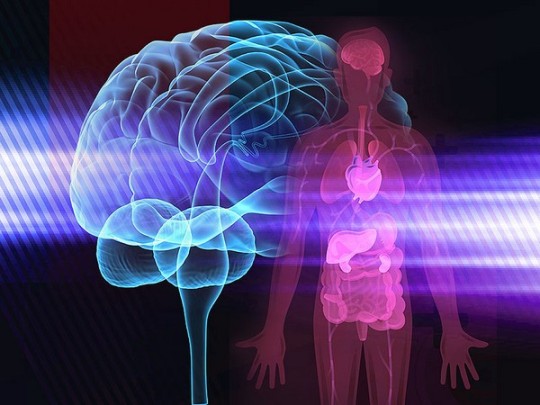
"YOUR MIND AND BODY MATTERS"
-October 28, 2020
Have you ever check upon yourself? Especially your mind and body? And if so, when is the last time you did it? As of now that the worlds facing a pandemic it is important to monitor our mind and body not just on the month of celebration about mental health. Many news are coming out about their physical and mental health to their family and personal problems in life especially those students who are having difficulties on their online classes. There are lots of sayings that this is not good for them as you browse on different social links that is based from their experience and it is sad to say that most students felt depression and anxiety that they killed themselves because their minds are full of pressure about simultaneously deadlines/activities and felt sick beacuse of having a lack of sleep. This is one of the examples I have cited that I wanted to encourage my fellow students to ask themeselves right now this kind of questions, "How healthy is my mind and body?" & "Am I truly happy and enjoying what I am doing?". Because we can't deny somehow we feel lost and empty. That's why it is important to assess if we are still okay about our physical and mental health because both are interconnected as our thoughts affects our physical body.
According to Newport Academy (2019), "The mind and the body are not two separate entities—although they are often treated that way. Physical health and emotional health are intimately intertwined in what’s known as the mind-body connection.
Our chemistry and biology impact our mood and emotions, as well as thoughts and beliefs. With all of these factors combined, they play a major role in influencing our stress and physical health. If you’ve ever felt your stomach tighten up when you were anxious, you’ve experienced the mind-body connection."
If you are one of this kind of students who doesn't have healthy mind and body or who wanted to know how to maintain your mind and body strong and healthy, here are Eight Habits for you according to Valentine (2017).
1. Exercise using something you love
Physical exercise has been shown in countless studies to help reduce stress, increase energy, improve mood, and even help make us more creative.
Great right? However, advice on how to make exercise a habit is a bit lacking. That’s because exercise can be a really difficult habit to stick to. But if there’s one thing I’ve found really helps stick to physical exercise and make it a long-term habit it’s this:
Exercise in a way that allows you to enjoy something you love.
You have to really look forward to working out. Whatever it is that you do, whether it’s running, lifting weights, doing cardio, martial arts, Yoga, or something else, you need to pick an exercise method you really enjoy.
For example, I love martial arts. I’m a lot more likely to stick to my work out while doing that than running or lifting weights. On the flip side, if there’s no particular exercise-like activity you enjoy, maybe you really love music. Play all your favorite music during your workout and you’ll notice yourself far more likely to get up to exercise. Another option is listening to podcasts about your craft while running.
Either way, exercise is a big one, so find a way to make it work for you.
2. Meditation
Meditation is another huge one. However, meditation isn’t really what most people think it is.
If you don’t like the traditional idea of meditation, you can meditate while doing virtually anything if you use the right method (i.e. mindfulness meditation). Also, studies have shown that as little as five to ten minutes of meditation offers great benefits, so don’t think you need to sit for a half hour every day. You really don’t.
Similar to physical exercise, there are several different methods and forms of meditation, so do a little adventuring and experimentation to find a method and form that works for you. Everyone is different and different methods of meditation tend to work better for different people.
3. Mindful walking
This is easily one of my favorite activities on this entire list, but it’s also the most obscure. Mindful walking, also known as walking meditation, is meditation in motion. It can be done formally as a dedicated practice and informally by paying attention to your steps and what is going on around you as you move.
This is great for many of the reasons formal meditation is (albeit less concentrated), however, there’s another big reason to do mindful walking: it helps you tune in to the body.
Sometimes, things occur in the body that we don’t notice. Oftentimes, chronic issues and illness begin to creep up in ways often unseen. However, by learning to tune in to the body with mindful walking, we can notice these things arise before they become more of an issue.
It’s a hard thing to explain, but it’s been infinitely useful to me. In many ways, this one exercise gives us a way to check in with both the mind and body on a regular basis and in an incredibly convenient way while going about our daily activities, so its place on this list is well-earned.
4. Rise early
Rising early is something I took years to develop. However, it was so worth it.
There are positives to staying up late, particularly if you find that you’re more productive or creative during late night hours. However, in general, I’ve found that the majority of people are most productive in the early morning hours.
In addition, though, waking up early and adopting a morning routine that prepares you for the day helps you start each day off with the optimal state of mind to tackle problems and make decisions, something incredibly useful for everyone no matter what your profession.
So, if you’re not already, see what waking up a little earlier does for you.
5. Adopt a nighttime routine
On the flip side of that, adopting an effective night time routine that puts your mind in the right state before bed and helps maximize the quality of your sleep is also incredibly beneficial.
Unfortunately, most of us in the West just don’t value sleep enough. We tend to place work above well-being and prefer to leave sleep for when we die. However, two decades of scientific research now says this isn’t just a bad idea health-wise – it’s unproductive.
Take some time to craft a simple but effective nighttime routine and I promise – you won’t regret it.
6. Remove sugar, add water, get your food from the source
This is the basic recipe I follow when it comes to nutrition advice.
Over the years, I’ve learned a lot and tried so many different things with regards to nutrition. At this point, my ideology on nutrition is pretty relaxed. And it’s never worked out better.
There’s a ton of advice out there and, rightfully, it can be pretty confusing. So, I’ve chosen to follow a pretty simple mantra that offers me roughly eighty percent of the benefit of any particular diet while doing about twenty percent of the work to get that benefit. It’s this:
Remove sugar: Sugar is bad. Really bad. Occasional sugar is just fine, even daily, as long as you try to keep it under 50g at an absolute a maximum (30g even better).
Add water: Buy a dedicated flask just for water and you’ll have a one thousand times higher likelihood of sticking to the habit of drinking water daily. About eight to ten cups is fine, but you should look into what your specific amount is based on your body weight.
Get your food from the source: Do you have a farm where you live? Or a farmer’s market? Awesome. Section of your grocery store with local farm foods? Pretty good too. Also, this refers to what food you eat as well. Put a little more whole foods into your diet or get a juicer.
Keep it simple and use this method to get most of the benefit of altering your diet while saving you time to focus on what’s most important to you.
7. Find friends who identify with your challenges
We’re social creatures. No matter what you do, you can’t escape this.
And so, by virtue of this, the more social we are, the healthier we tend to be.
However, there’s something very specific about relationships that helps us more than anything else: having people around us who identify and sympathize with our challenges and who we communicate with often about those challenges. The lack thereof is often the reason for suicide in those who suffer from depression or bullying.
When we have people around us who listen and understand what we’re going through, something magical happens: we get through it (what it is for you). It’s a very simple thing that we often overlook but is so critical to our mental and even physical health.
8. Find a passion project or creative outlet
If you’ve been pursuing something you love for some time now, I don’t have to tell you how great it makes you feel.
The energy we get while pursuing our passions is limitless and gives us a sense of vitality that is hard (if impossible) to acquire any other way.
Using our brain regularly keeps our mind strong and moving helps keep us physically healthy, so if you haven’t yet taken the time to find what you’re passionate about and to start pursuing that with every fiber of your being, start now (before it’s too late).
There's no harm in trying, our mind and physical gives us energy. A person who can change his/her mind can change his/her lives. Always remember health is our wealth. Keep on checking and doing the things you love.
Sources:
Newport Academy, (2019). Understang the Mind-Body Connection. https://www.newportacademy.com/resources/mental-health/understanding-the-mind-body-connection/
Valentine, M., (2017). 8 Habits You Need to Lock Down for a Strong, Healthy Mind and Body. https://www.goalcast.com/2017/12/14/8-habits-healthy-mind-and-body/
6 notes
·
View notes